Mississippi Documents
Quitclaim Deed
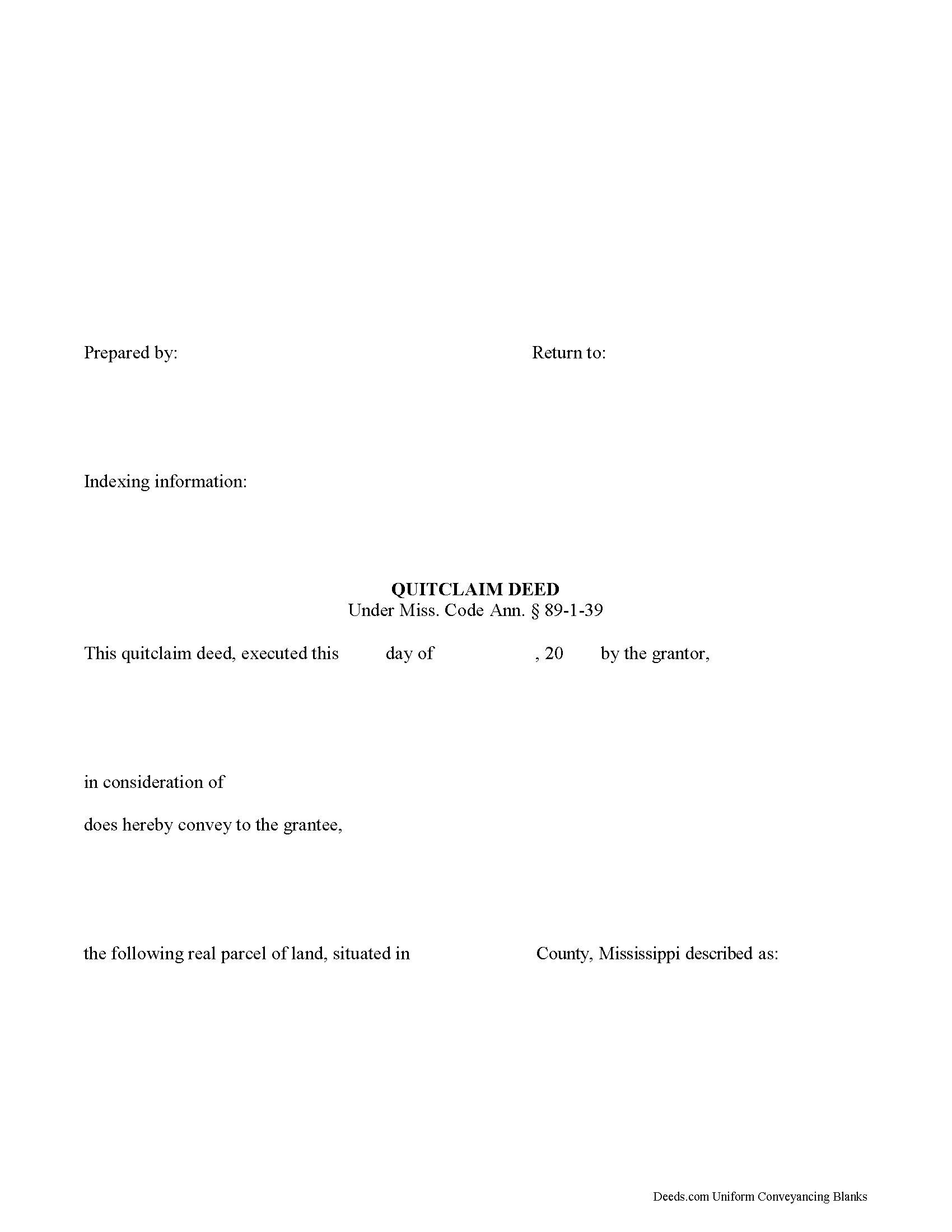
Before a quitclaim deed can be recorded with a county recorder in Mississippi, the grantor must sign and acknowledge it. The names, addresses, and telephone numbers of the grantors and grantees to the quit claim deed, along with a legal description of the real property should be provided on the first page (89-5-24). For further guidance, formatting and legibility requirements pertaining to the recordation process are provided in 89-5-24 of the Mississippi statutes. In the process of recording a quit claim deed in Mississippi, affidavits relating to marital status and identification may be required to accompany the document (89-5-8). A quit claim deed must be recorded in the county where the property is located.
In Mississippi, a quitclaim deed will not be valid against a purchaser or any creditor for valuable consideration without notice unless it is recorded in the county where the property is located. After a quit claim deed is filed by the recording clerk, the priority of the time of filing will determine the priority of all conveyances of the same land as it concerns the several holders of such conveyances (89-5-1). An unrecorded conveyance or one that has not been filed fo... More Information about the Mississippi Quitclaim Deed
Quitclaim Deed Reserving Life Estate
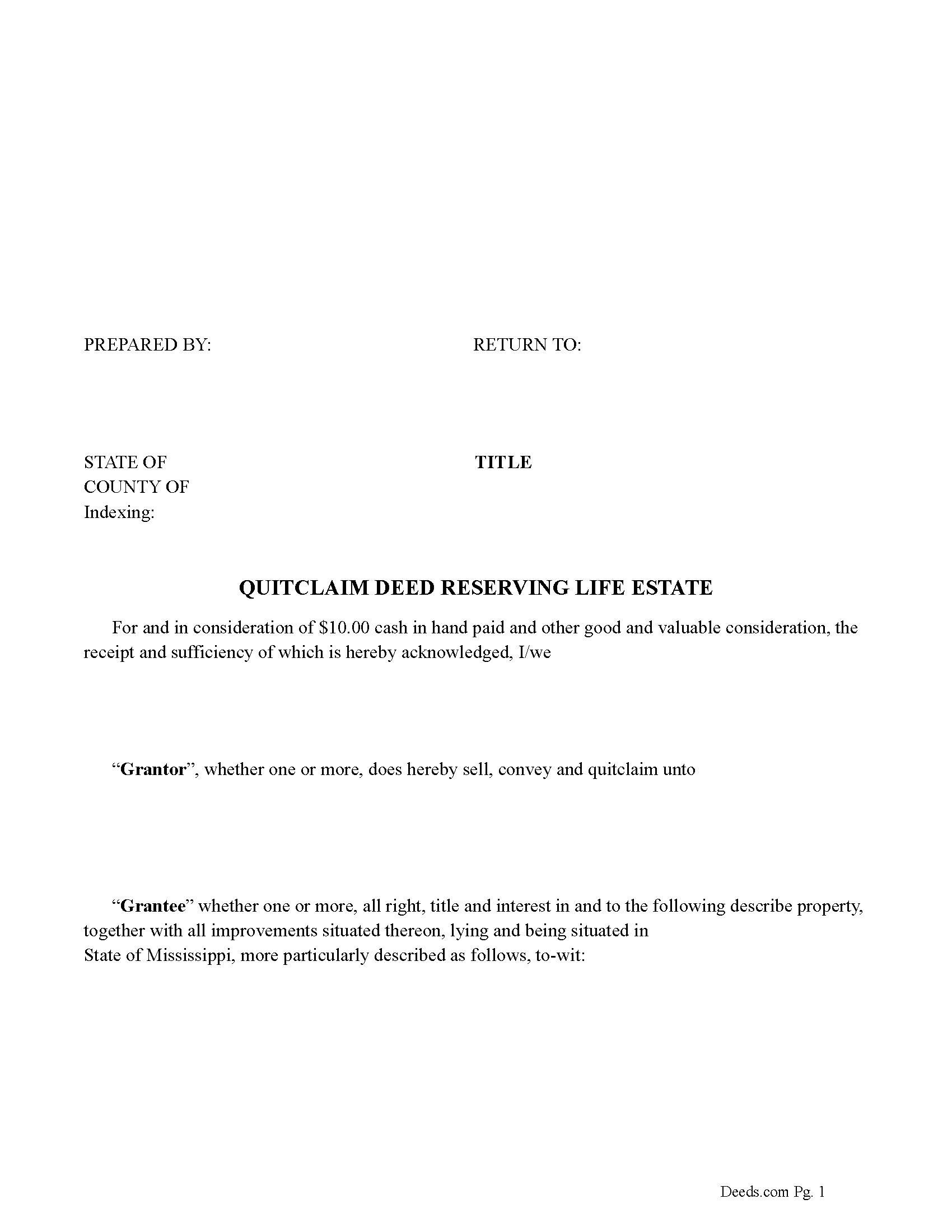
A Mississippi quitclaim deed reserving a life estate is a legal document used to transfer property ownership while allowing the grantor (the person selling or giving the property) to retain possession and use of the property for the duration of their life. This type of deed offers both an immediate transfer of the property's title and a mechanism for ensuring that the grantor can live on or use the property until their passing.
89-1-37. Effect of a conveyance without warranty. A conveyance without any warranty shall operate to transfer the title and possession of the grantor as a quitclaim and release.
Reservation of Life Estate: This section specifically states that the grantor is reserving a life estate in the property. By doing so, the grantor retains the right to possess, use, and obtain any profits from the property for the duration of their life. Upon the grantor's death, the life estate automatically terminates, and the grantee possesses the property in full, without any further legal action.
Estate Planning: One of the primary uses of a quitclaim deed reserving a life estate is in estate planning. It allows individuals to ensure that their heirs or chosen benefic... More Information about the Mississippi Quitclaim Deed Reserving Life Estate
Gift Deed
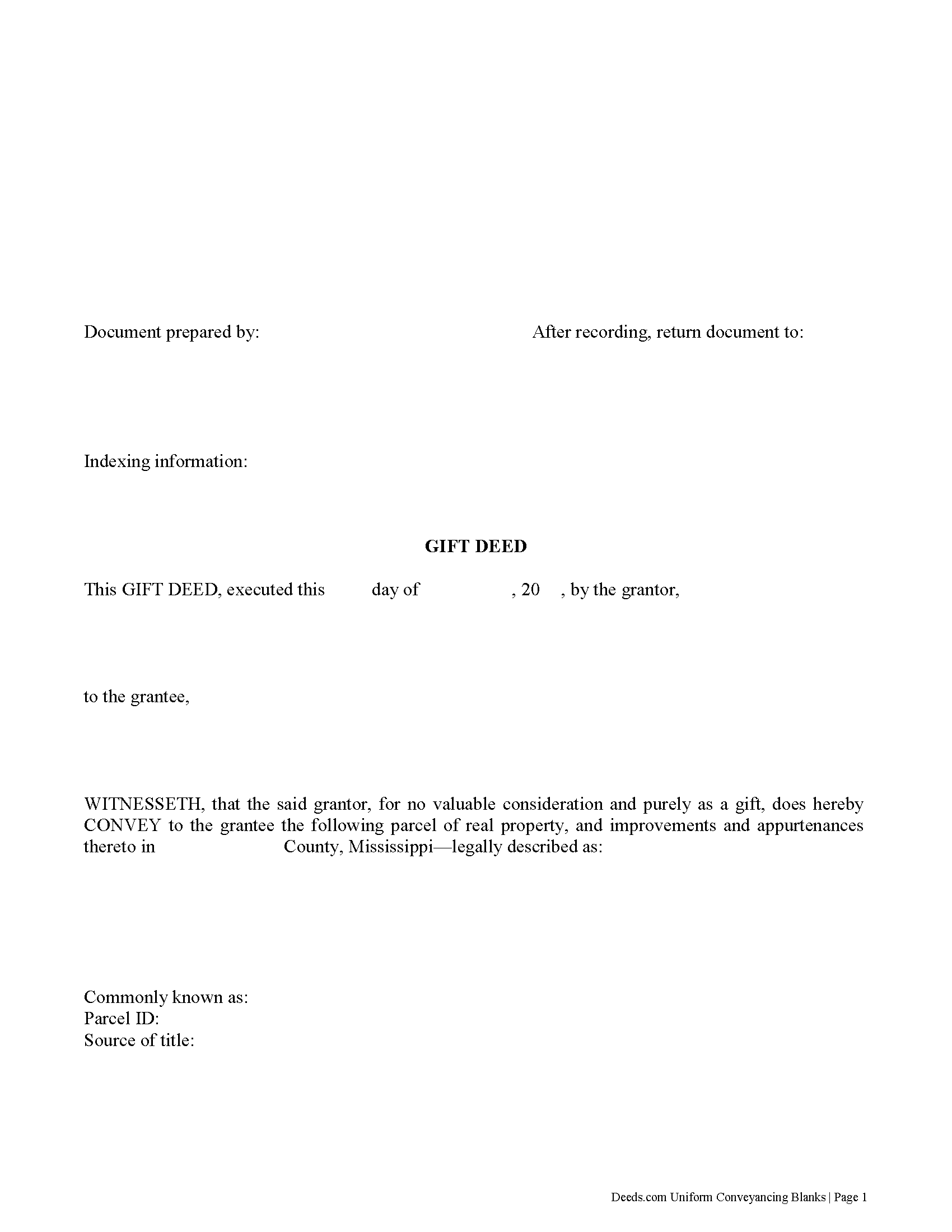
Gifts of Real Property in Mississippi
A gift deed, or deed of gift, is a legal document voluntarily transferring title to real property from one party (the grantor or donor) to another (the grantee or donee). A gift deed typically transfers real property between family or close friends. Gift deeds are also used to donate to a non-profit organization or charity. The deed serves as proof that the transfer is indeed a gift and without consideration (any conditions or form of compensation).
Valid deeds must meet the following requirements: The grantor must intend to make a present gift of the property, the grantor must deliver the property to the grantee, and the grantee must accept the gift. Gift deeds must contain language that explicitly states no consideration is expected or required, because any ambiguity or reference to consideration can make the deed contestable in court. A promise to transfer ownership in the future is not a gift, and any deed that does not immediately transfer the interest in the property, or meet any of the aforementioned requirements, can be revoked [1].
A lawful gift deed must also include the grantor's full name and marital status, as well as t... More Information about the Mississippi Gift Deed
Warranty Deed
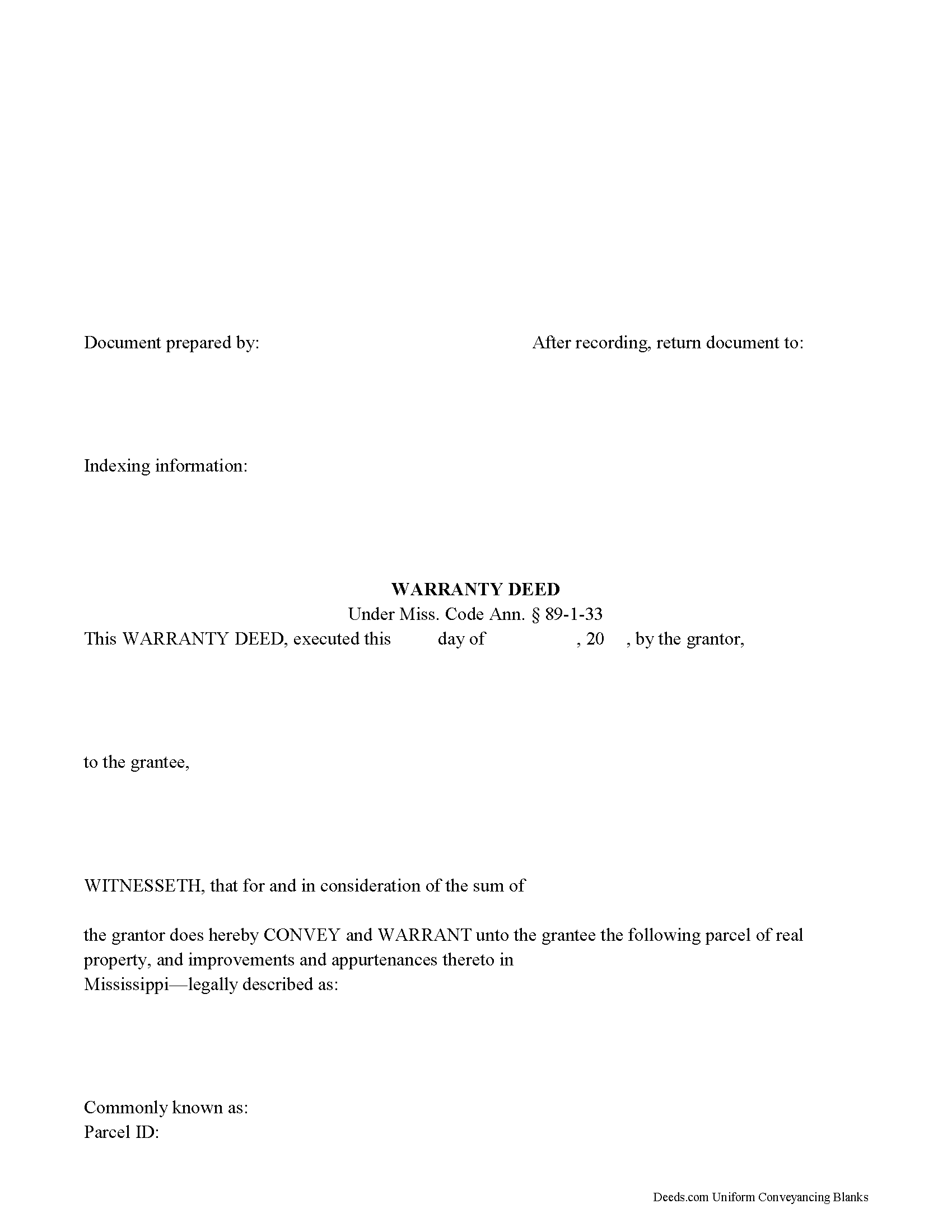
Real property conveyances are governed by Title 89 of the Mississippi Revised Code. The state does not provide a statutory form for warranty deeds, but it sets forth acceptable language for deeds under Miss. Code Ann. 89-1-61.
Warranty deeds are used to convey property from the grantor (generally the owner) to the grantee (generally the purchaser) with the fullest surety of title (Miss. Code Ann. 89-1-33). By using the word "warrant," the grantor guarantees that the he or she holds clear title to the real estate, has the right to sell the property to the grantee, and he or she will warrant the title against all persons whomsoever. This guarantee extends throughout the property's history. The grantor also warrants that they did not encumber the property in a way prohibiting transfer, and that the deed references all easements, restrictions, or other agreements of record that relate to the specific parcel of land.
As with any conveyance of real estate, a warranty deed requires a complete legal description of the parcel and an explanation of the source of title. In addition to meeting all state and local standards for recorded documents, a lawful deed must include the grantor's ... More Information about the Mississippi Warranty Deed
Warranty Deed Reserving Life Estate
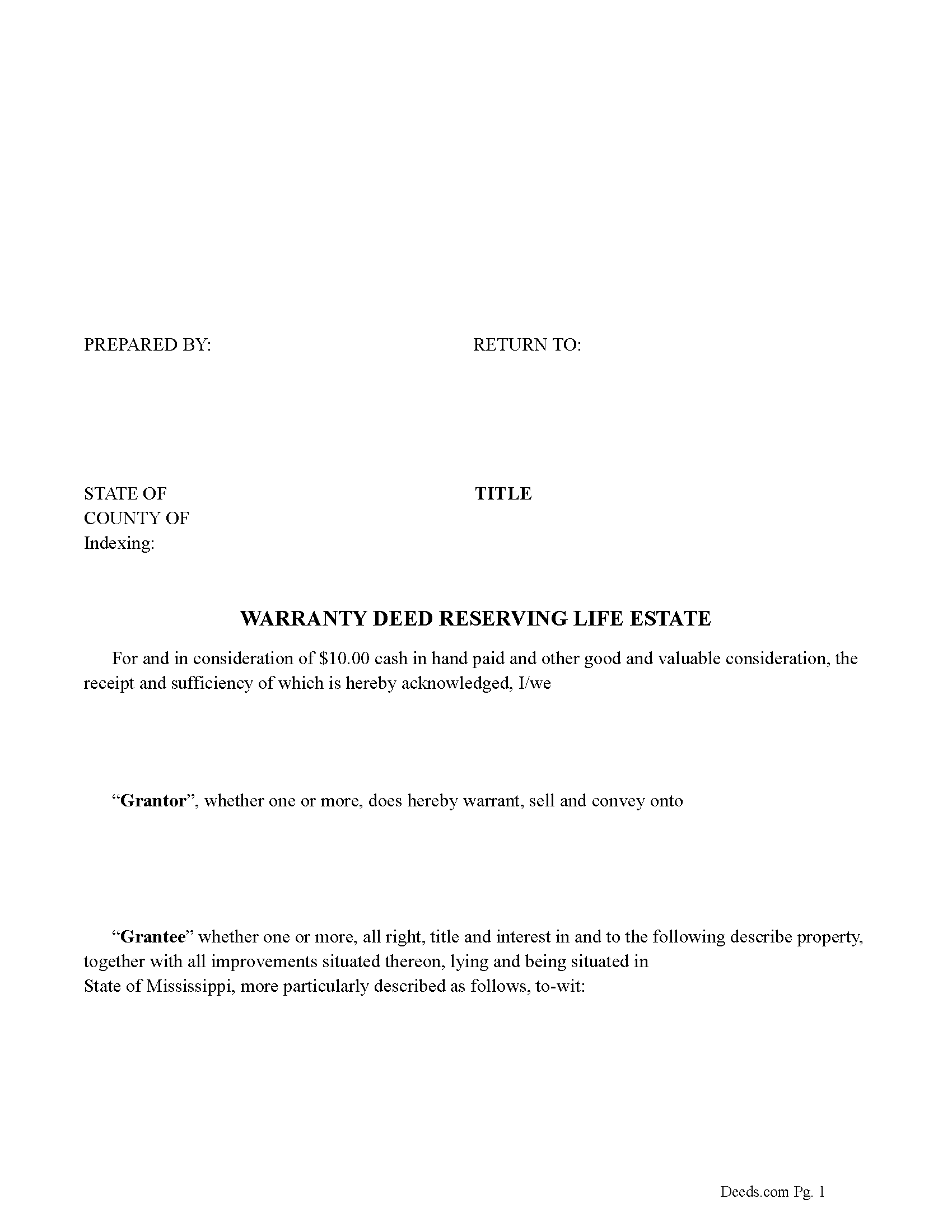
A Mississippi warranty deed reserving a life estate is a legal document used to transfer property ownership while allowing the grantor (the person selling or giving the property) to retain possession and use of the property for the duration of their life. This type of deed offers both an immediate transfer of the property's title and a mechanism for ensuring that the grantor can live on or use the property until their passing. In Mississippi, a warranty deed is a deed where the grantor (seller) guarantees that they hold clear title to a piece of real estate and have a right to sell it to the grantee (buyer). The guarantee is not limited to the time the grantor owned the property---it extends back to the property's origins. This means that the grantor is guaranteeing that there are no encumbrances or claims on the property from before they took ownership.
89-1-33. Effect of word "warrant" in conveyance. The word "warrant" without restrictive words in a conveyance shall have the effect of embracing all of the five (5) covenants known to common law, to wit: seizin, power to sell, freedom from incumbrance, quiet enjoyment and warranty of title.
Reservation of Life Estate: This s... More Information about the Mississippi Warranty Deed Reserving Life Estate
Special Warranty Deed
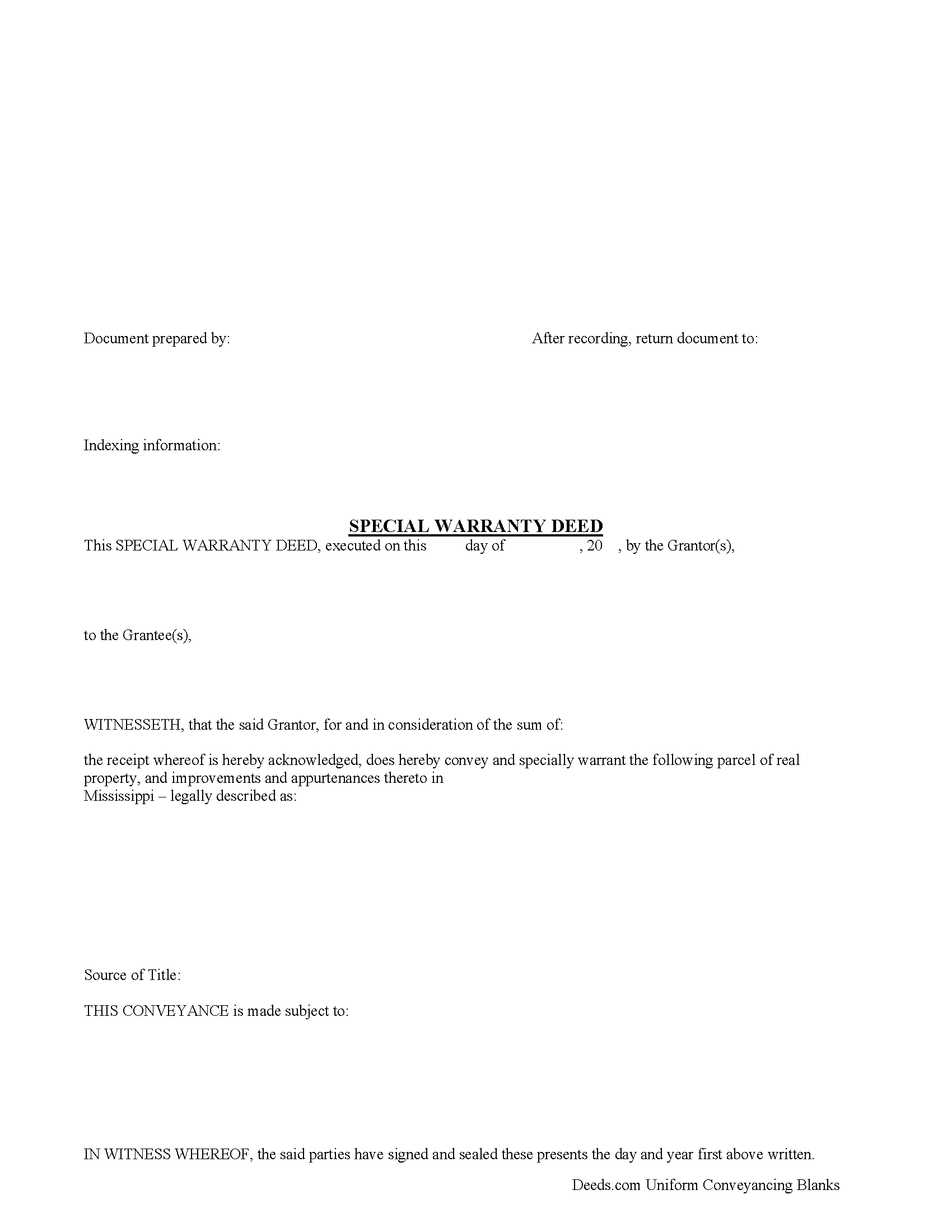
A special warranty deed can be used to convey real property in this state. The use of the words "warrant specially" in a conveyance of real estate in Mississippi constitute a covenant that the grantor, his heirs, and personal representatives, will forever warrant and defend the title of the property unto the grantee and his heirs, representatives, and assigns, against the claims of all persons claiming by, through, or under the grantor ( 89-1-35). The statutory language for a conveyance in section 89-1-61 of the Mississippi Revised Code can be used for a special warranty if the words "warrant specially" are inserted. The grantor in a special warranty deed makes no warranty for the preceding owner's title.
For a special warranty deed or other conveyance of land to be effective, it must be signed by the grantor and delivered ( 89-1-3). The acknowledgment or proof of a special warranty deed is necessary to entitle the instrument to be recorded. The acknowledgment or proof should be certified by any of the officers listed in section 89-3-3 of the Mississippi Revised Code. If the party executing the special warranty deed resides in a state other than Mississippi, the deed can be ack... More Information about the Mississippi Special Warranty Deed
Grant Deed
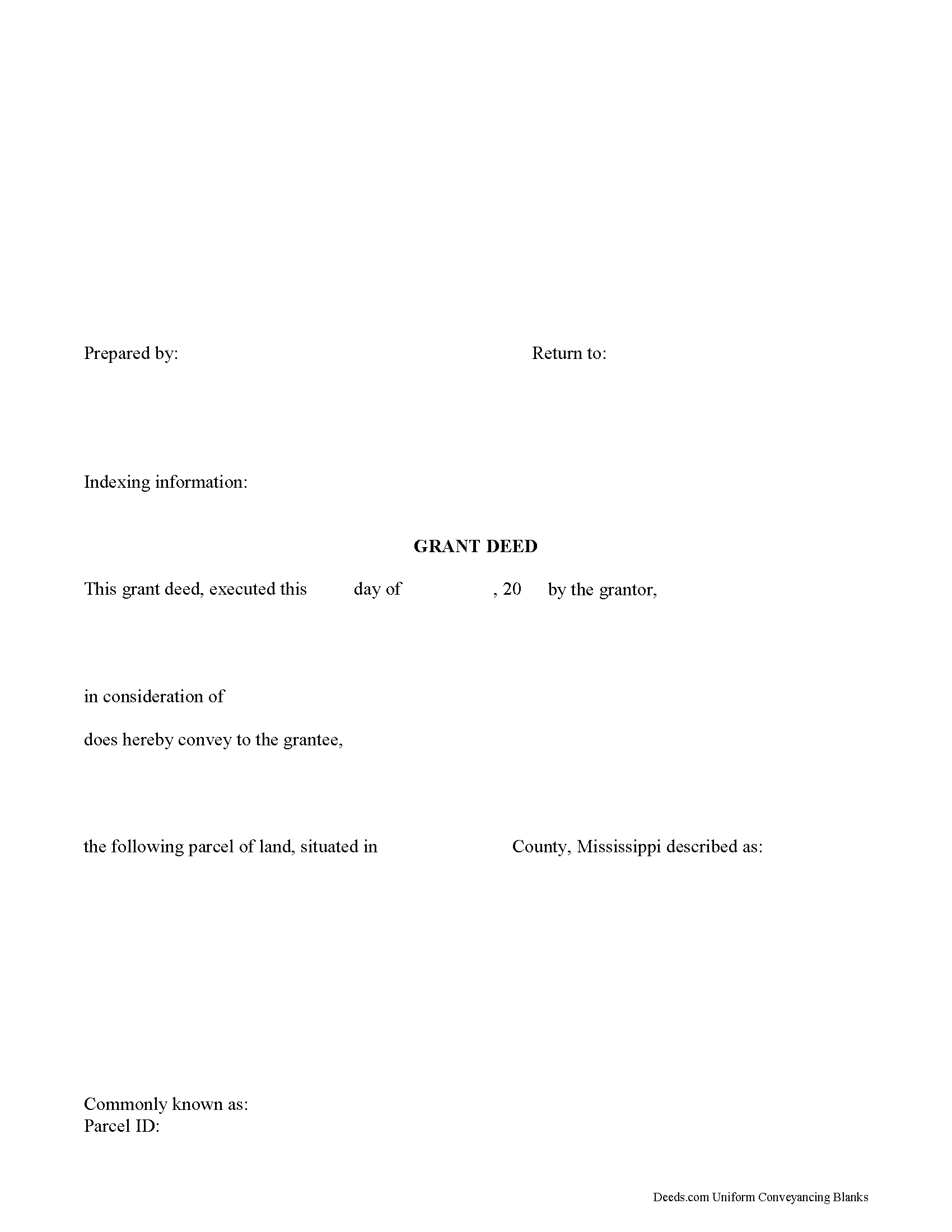
A grant deed can be used to convey real property in Mississippi. In a conveyance of real estate in this state, the use of the words "grant, bargain, and sell" will operate as an express covenant to the grantee, his heirs, and assigns, that the grantee was seized of an indefeasible estate, free from encumbrances made or suffered by the grantor, except the rents and services that may be reserved, and also for quiet enjoyment against the grantor, his heirs, and assigns, unless limited by specific words contained in the deed ( 89-1-41).
A grant deed in Mississippi is required to be declared in writing, signed by the grantor, and delivered ( 89-1-3). Grant deeds should be acknowledged or proved in order to entitle them to be recorded, and such acknowledgment or proof should be certified by an officer authorized to take acknowledgments. Any of the officers listed in section 89-3-3 of the Mississippi Revised Code are authorized to acknowledge or prove deeds. If the party executing a grant deed or other conveyance does not reside in Mississippi, the deed can be acknowledged or proved by any of the officers listed in 89-3-9, and the instrument will be as good and effectual as if the cert... More Information about the Mississippi Grant Deed
Correction Deed
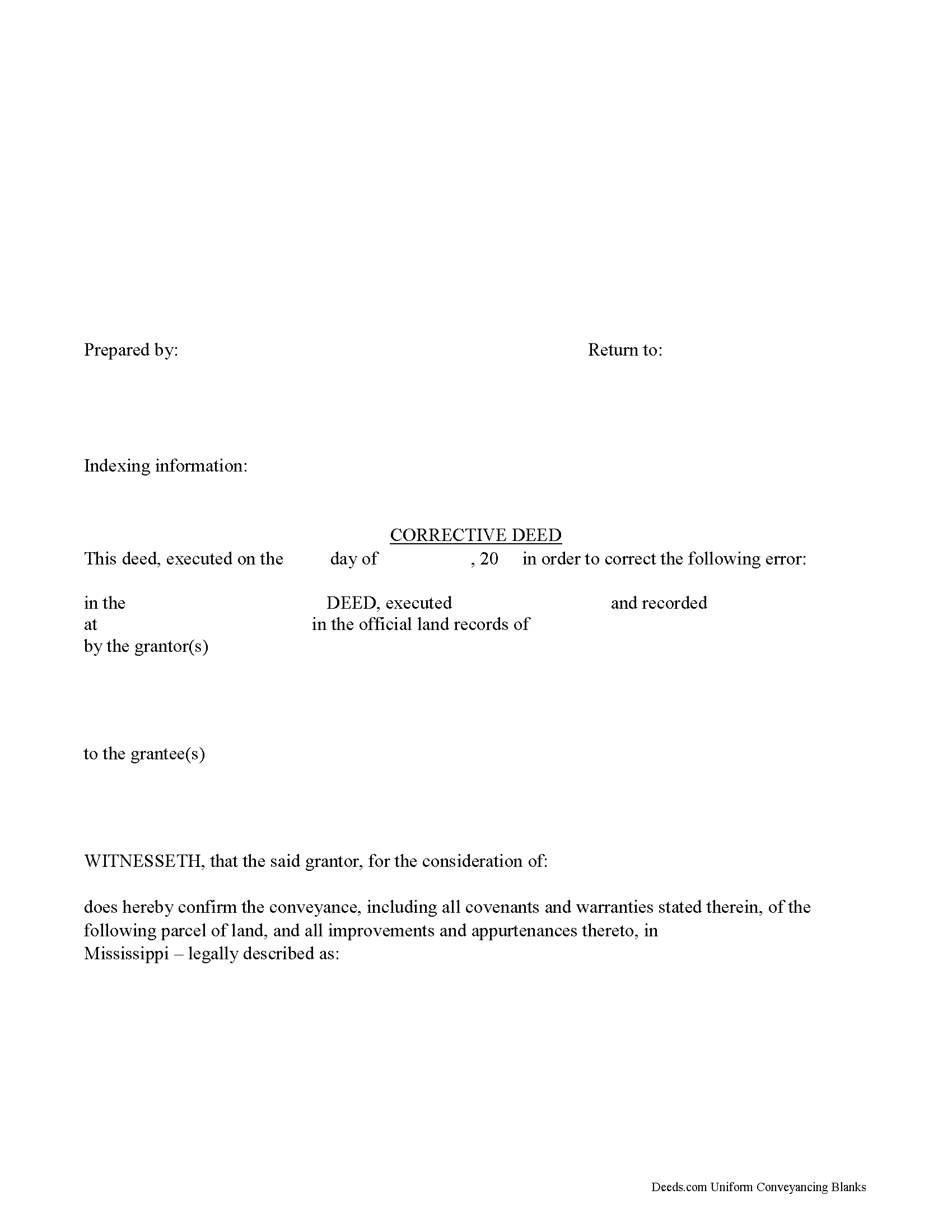
Use the corrective deed to amend a previously recorded warranty, special warranty, or quitclaim deed with an error that could affect future title transfer.
A corrective deed is, in effect, an explanation and correction of an error in a prior instrument. As such, it passes no title, but only reiterates and confirms the prior conveyance. It should be executed from the original grantor to the original grantee, and it needs to be recorded in order to be legally valid.
The corrective deed must reference the original conveyance it is correcting by type of error, date of execution and recording, and recording number and location. Beyond that, it restates the information given in the prior deed, thus serving as its de facto replacement. The prior deed, which constitutes the actual conveyance of title, remains on record and will receive a marginal cross-reference to the subsequent recording of a corrective deed.
Deeds of correction are most appropriate for minor errors and omissions in the original deed, such as misspelled names, omission of marital status, or typos in the legal description. More substantial changes, such as adding a name to the title or adding/subtracting a porti... More Information about the Mississippi Correction Deed
Easement Deed
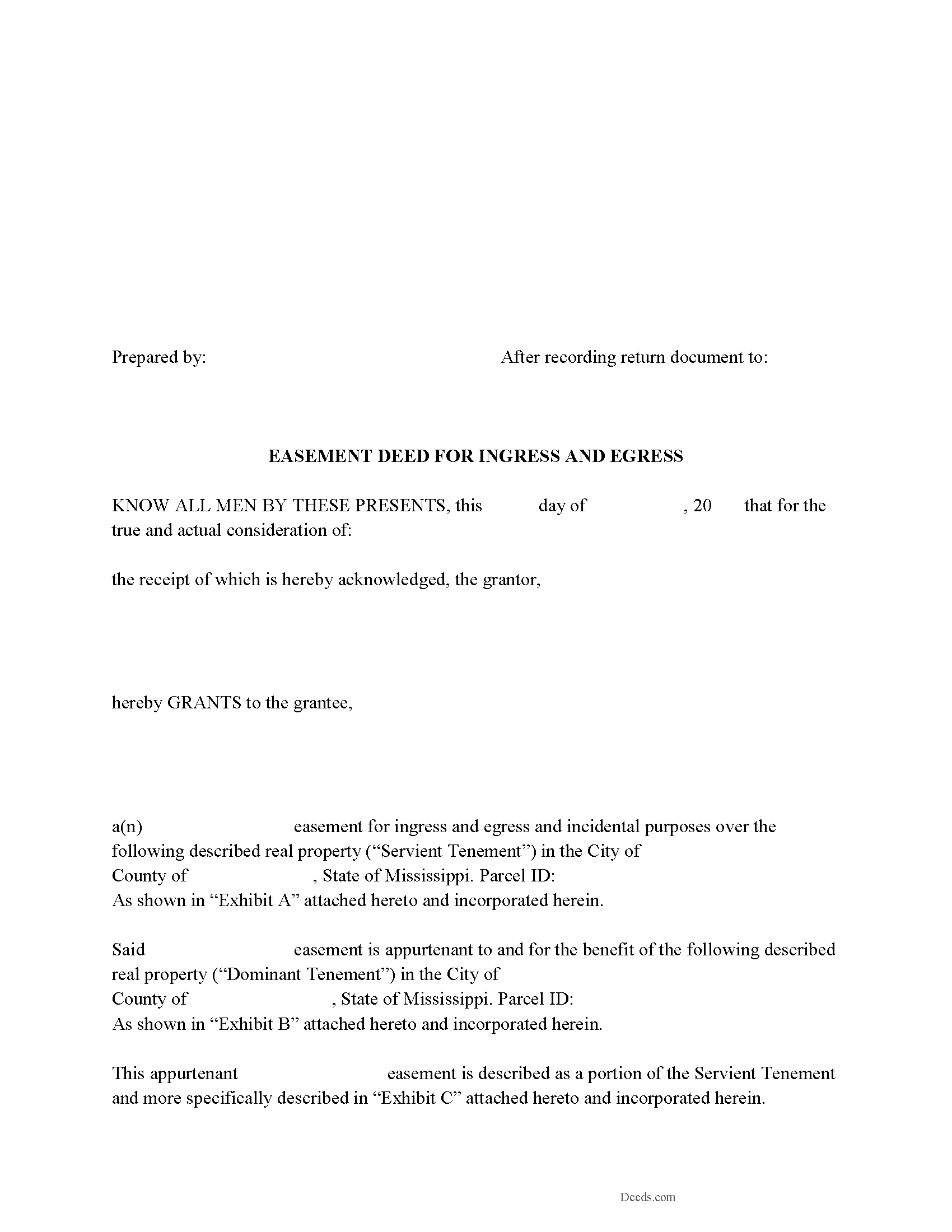
An easement is a real property interest, but does not include rights of ownership. Easements allow one party to use the land of another for a specific purpose. This agreement is created by an easement deed, which can be made to benefit a dominant estate or an individual or legal entity, and can also be affirmative or negative. An easement in Mississippi will run with the land.
A conservation easement can be created, conveyed, recorded, and assigned in the same manner as other easements in the state. Except as may be provided by statute, a conservation easement is unlimited in its duration unless the instrument creating it provides otherwise ( 89-19-5). No right or duty in favor of or against a holder and no right of a person having a third-party right of enforcement arises under a conservation easement before its acceptance by the holder and a recordation of the acceptance ( 89-19-5).
An easement deed should be declared in writing, signed by the grantor, and delivered ( 89-1-3). Easement deeds should be acknowledged or proved, and the acknowledgment or proof should be certified by any of the authorized officers listed in section 89-3-3 of the Mississippi Revised Code. Acknowl... More Information about the Mississippi Easement Deed
Termination of Easement
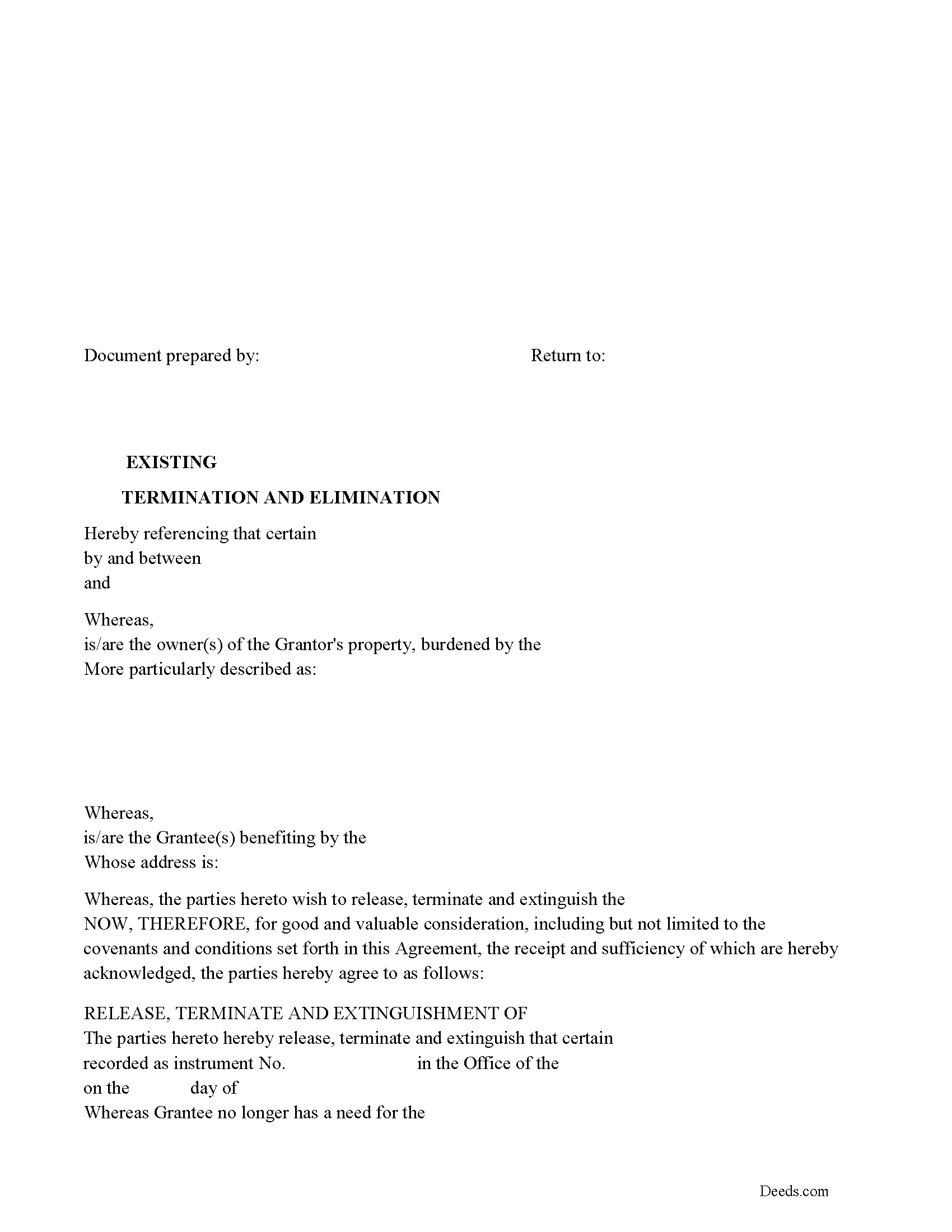
Use this form to release, terminate, extinguish a previously recorded document that involves access to and from a property.
Documents such as:
1. Easement Deeds or Agreements (An easement is a non-possessory interest in land, granting the right to use someone else's property for a specific purpose, like a driveway or utility line)
2. Access Roads
3. Right of Ways
4. Utility Easements (Power, Gas, Water, Sewer, Etc.)
5. Drainage Easements
This document allows the owner of the land, burdened by the access and the party that benefits from the access, to sign an agreement releasing the property from such access, ... More Information about the Mississippi Termination of Easement
Trustee Deed for Inter Vivos Trust
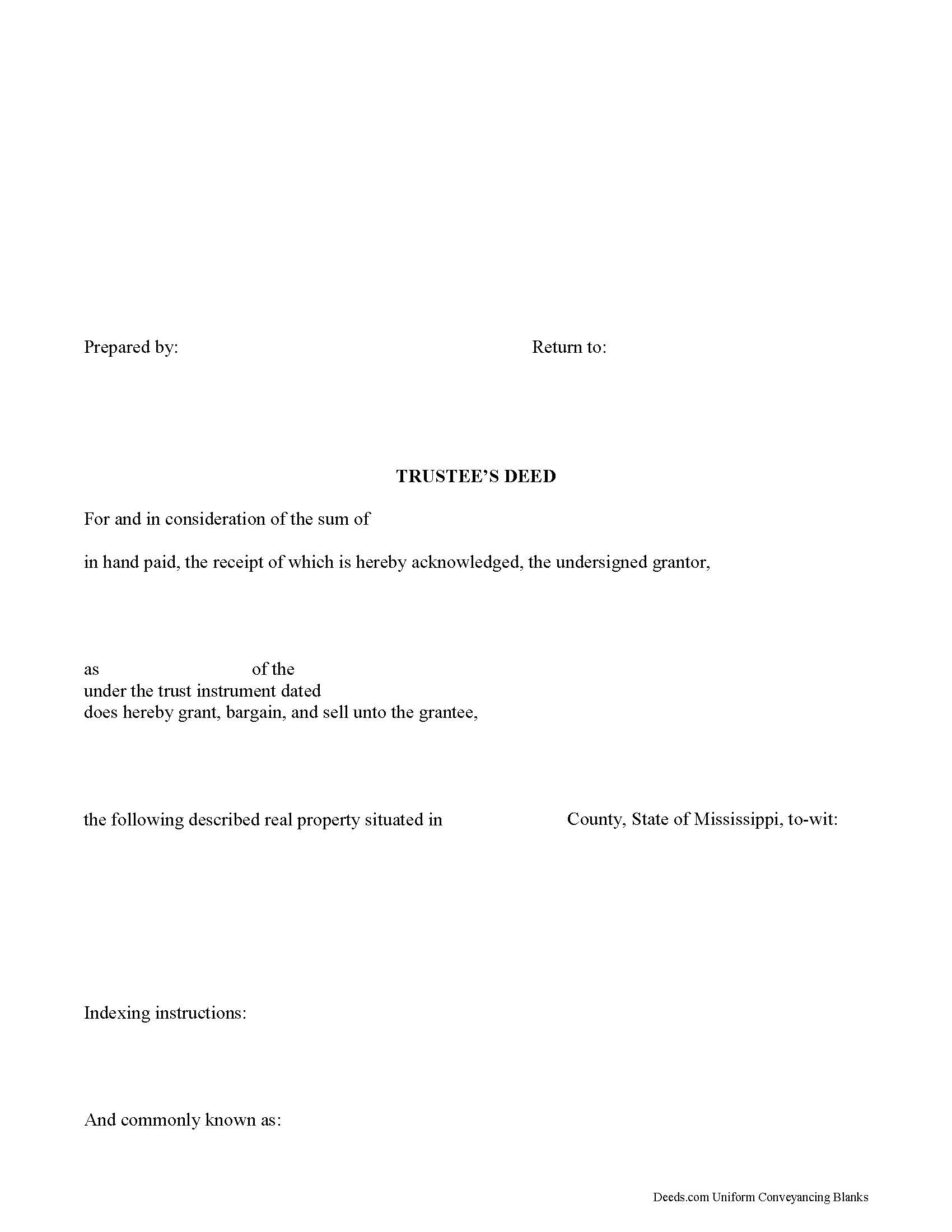
Use a trustee's deed to transfer real property held in an inter vivos trust (also called a living trust). This type of deed is named for the executing trustee of the living trust, who holds legal title to the real property transferred into trust by the trust's settlor, and not for the type of warranty it carries, as with other forms of conveyance. Note that this type of trustee's deed is separate from the trustee's deed used to convey real property under a deed of trust upon foreclosure.
The trustee's deed for a living trust recites the trustee's name, address, telephone number, and capacity, and includes the name of and date of the trust on behalf of which the trustee is authorized to act. In addition, it includes the grantee's name, address, telephone number, and vesting information. Trustees may produce a certification of trust under Miss. Code Ann. 91-8-1013 verifying the trustee's authority to enter into the transaction.
The form's granting language contains implied covenants "that the grantor was seized of an estate, free from incumbrance made or suffered by the grantor, except the rents and services that may be reserved, and also for quiet enjoyment against the grant... More Information about the Mississippi Trustee Deed for Inter Vivos Trust
Revocable Transfer on Death Deed
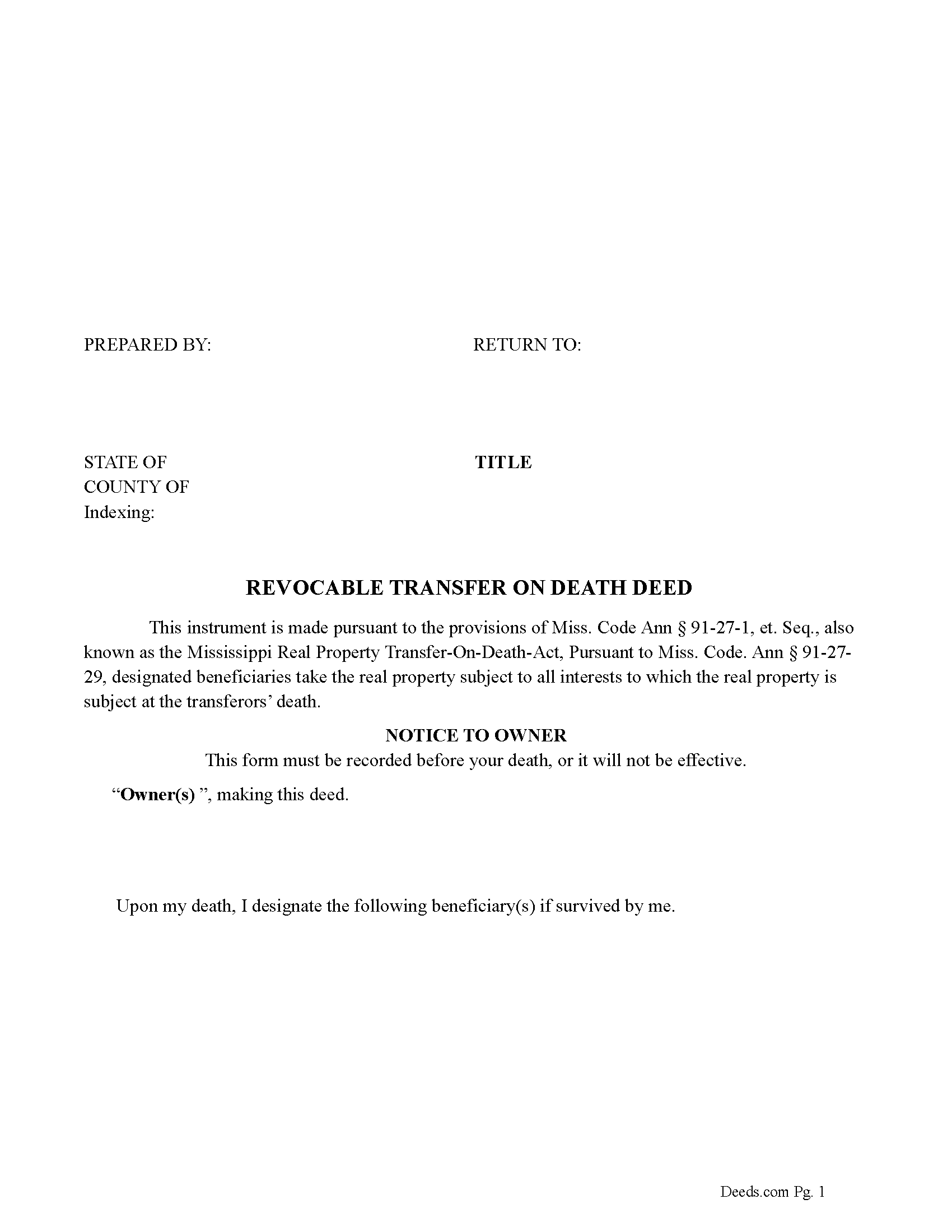
On July 1, 2020, the "Mississippi Real Property Transfer on Death Act" became effective, allowing the owner/transferor the right to transfer his/her/their property rights upon the death of the transferor(s). {"Transferor" means an individual who makes a transfer-on-death deed.} The instrument used is a "Transfer on Death Deed" (TODD). The transferor(s) names a designated beneficiary(s)/transferee(s) who will receive the property upon the transferor's death. ["Beneficiary" means a person who receives real property under a transfer-on-death deed.] To be effective the TODD must be recorded before the transferor's death ({in the official records of the chancery clerk of the county where the real property is located)}. A TODD is unique in that it does NOT have to be delivered or accepted by the beneficiary(s). {Section 91-27-3 (g)} [Section 91-27-3(b)] ({Section 91-27-17(3)})
A TODD allows the transferor to keep possession of the subject property throughout his/her/their lifetime and is frequently used to bypass the probate process, thus saving time and money. A TODD may be revoked, by the transferor if the revocation is recorded before the death of the transferor.
Section 91-2... More Information about the Mississippi Revocable Transfer on Death Deed
Revocation of Transfer on Death Deed
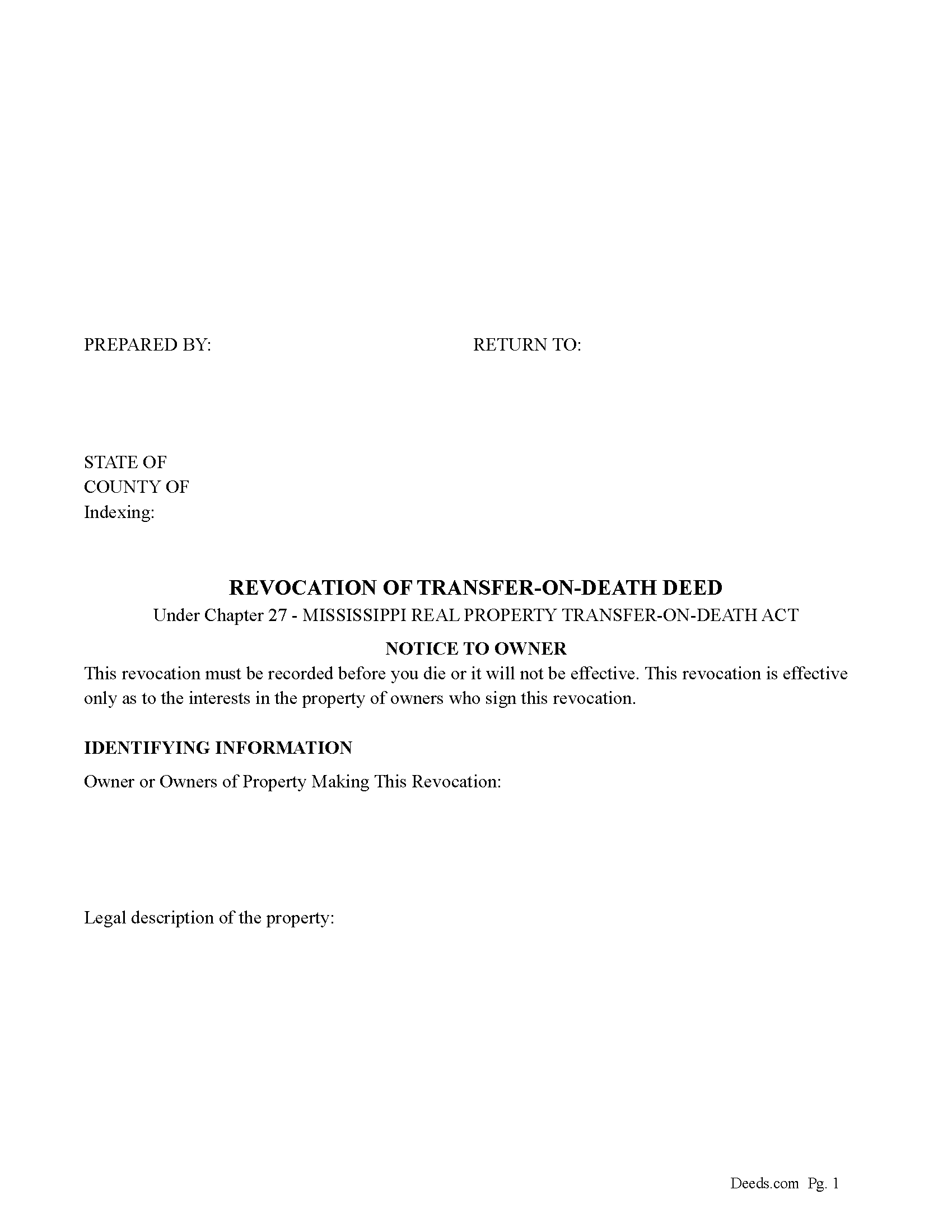
Use this form to revoke or partially revoke a previously recorded Revocable Transfer on Death Deed.
Section 91-27-21 - Revocation by instrument authorized; revocation by act not permitted
(a) Subject to subsections (d) and (e), an instrument is effective to revoke a recorded transfer-on-death deed, or any part of it, if the instrument:
(1) Is one (1) of the following:
(A) A subsequent transfer-on-death deed that revokes the preceding transfer-on-death deed or part of the deed expressly or by inconsistency; or
(B) Except as provided by subsection (b), an instrument of revocation that expressly revokes the transfer-on-death deed or part of the deed;
(2) Is acknowledged by the transferor after the acknowledgment of the deed being revoked; and
(3) Is recorded before the transferor's death in the official records of the chancery clerk of the county where the deed being revoked is recorded.
(b) A will does not revoke or supersede a transfer-on-death deed.
(c) If a marriage between the transferor and a designated beneficiary is dissolved after a transfer-on-death deed is recorded, a final judgment of the court dissolving the marriage operates to revoke the transfer-on-death d... More Information about the Mississippi Revocation of Transfer on Death Deed
Executor Deed
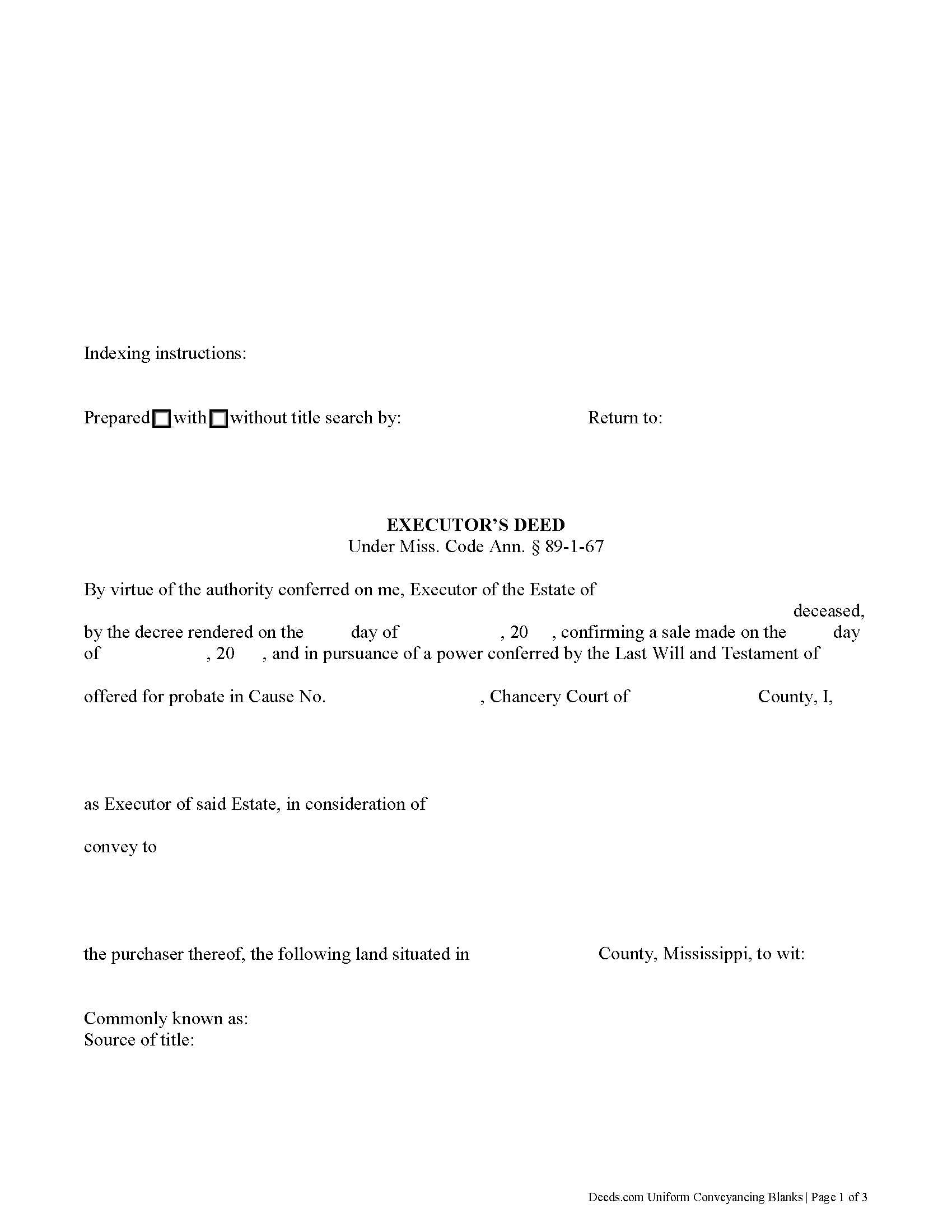
An executor's deed is a fiduciary instrument used in probate proceedings to convey property from an estate. An executor is a personal representative named in the decedent's will to settle a testate estate.
The executor's deed under Miss. Code Ann. 89-1-67 quitclaims the grantor's title to a purchaser. In addition to meeting the form and content requirements for standard transfers of real property, executor's deeds contain pertinent information about the estate, including the source of the executor's authority to sell.
Use an executor's deed to convey title to the decedent's real property pursuant to the provisions of a will ( 91-7-49) or a decree of the Chancery Court following petition for sale. The executor may need to sell real property when the decedent's personal property is insufficient to pay the estate's outstanding debts, or when the sale is in the best interest of the distributees, as determined by the Court.
The probate process can be complicated, so contact an attorney with questions about executor's deeds or any other issue related to probate in Mississippi.
(Mississippi ED Package includes form, guidelines, and completed example)... More Information about the Mississippi Executor Deed
Administrator Deed
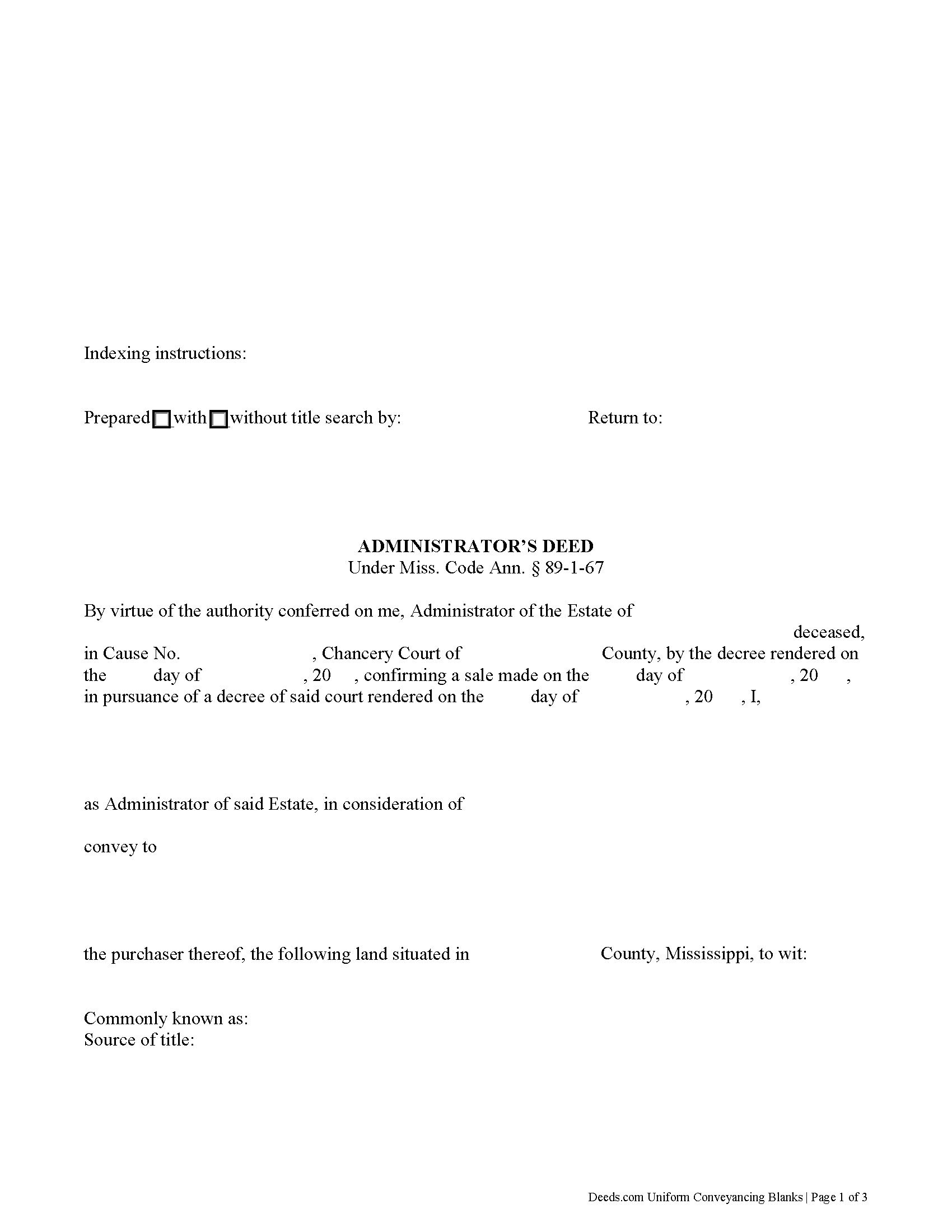
An administrator's deed is a fiduciary instrument used in probate proceedings to convey property from an estate. An administrator is a personal representative appointed by the Chancery Court when the decedent dies intestate (without a will), or a testate decedent does not name an executor of his/her will (or the named executor cannot or will not serve).
The administrator's deed under Miss. Code Ann. 89-1-67 quitclaims the grantor's title to a purchaser. In addition to meeting the form and content requirements for standard transfers of real property, administrator's deeds contain pertinent information about the estate, including the source of the administrator's authority to sell.
Use an administrator's deed to convey title to the decedent's real property pursuant to a decree of the Chancery Court following petition for sale. The administrator may need to sell real property when the decedent's personal property is insufficient to pay the estate's outstanding debts, or when the sale is in the best interest of the distributees, as determined by the Court.
The probate process can be complicated, so contact an attorney with questions about administrator's deeds or any other i... More Information about the Mississippi Administrator Deed
Mineral Deed
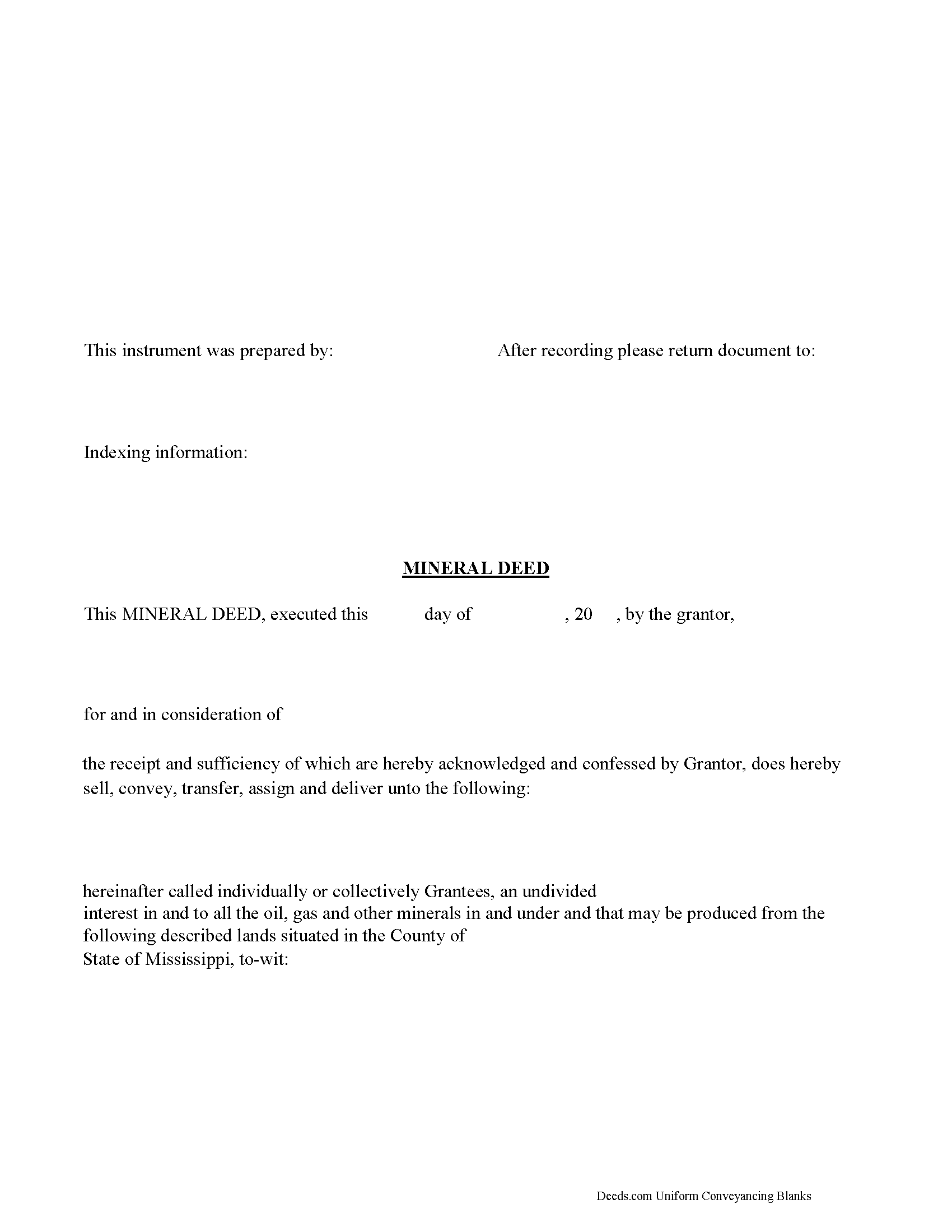
The General Mineral Deed in Mississippi transfers oil, gas, and mineral rights from the grantor to the grantee. THIS IS NOT A LEASE. There are no Exceptions or Reservations included.
The transfer includes the oil, gas and other minerals of every kind and nature. It also transfers any and all rights to receive royalties, overriding royalties, net profits interests or other payments out of or with respect to those oil, gas and other minerals. The Grantor can stipulate the percentage of Mineral Rights the Grantee will receive and is made subject to any rights existing under any valid and subsisting oil and gas lease or leases of record.
This general mineral deed gives the grantee the right to access, for the purpose of mining, drilling, exploring, operating and developing said lands for oil, gas, and other minerals, and storing handling, transporting and marketing of such.
In this document the Grantor Warrants and will defend said Title to Grantee. Use of this document has a permanent effect on your rights to the property, if you are not completely sure of what you are executing seek the advice of a legal professional.
(Mississippi MD Package includes form, guidelines, and... More Information about the Mississippi Mineral Deed
Mineral Deed with Quitclaim Covenants
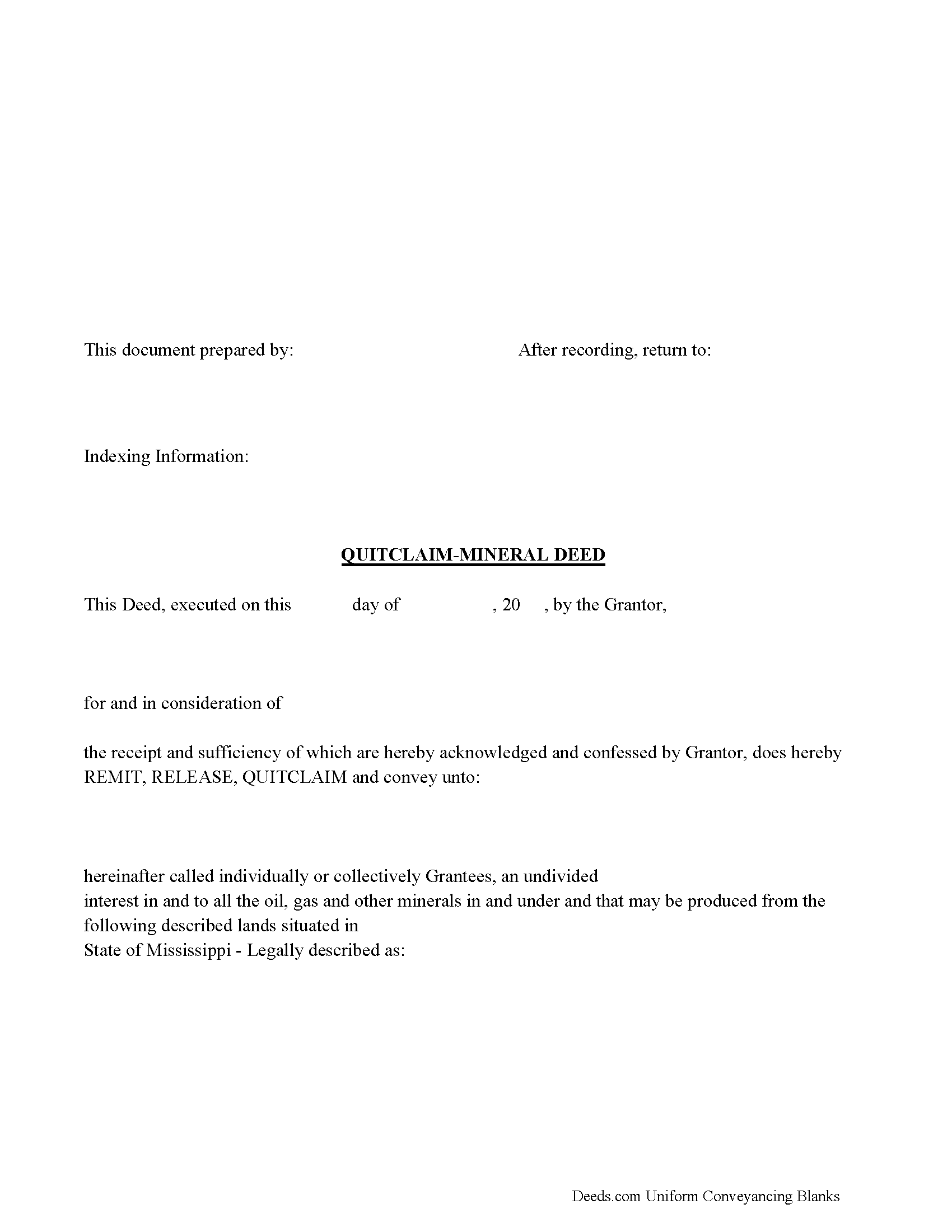
The General Mineral Deed in Missouri Quitclaims oil, gas, and mineral rights from the grantor to the grantee. THIS IS NOT A LEASE. There are no Exceptions or Reservations included.
The transfer includes the oil, gas and other minerals of every kind and nature. The Grantor can stipulate the percentage of Mineral Rights the Grantee will receive.
This general mineral deed gives the grantee the right to access, for the purpose of mining, drilling, exploring, operating and developing said lands for oil, gas, and other minerals, and storing handling, transporting and marketing of such.
The seller, or grantor Quitclaims the mineral rights and does NOT accept responsibility to any discrepancy of title (This assignment is without warranty of title, either express or implied)
Uses: Mineral deeds with quitclaim are often used in situations where the grantor wants to quickly release any interest they might have in mineral rights, such as in settling estates, resolving disputes, clearing up uncertainties about ownership in a title's history or when mineral rights have previously been severed or fragmented from surface rights and cloud a title, making it difficult to transfer propert... More Information about the Mississippi Mineral Deed with Quitclaim Covenants
General Durable Power of Attorney
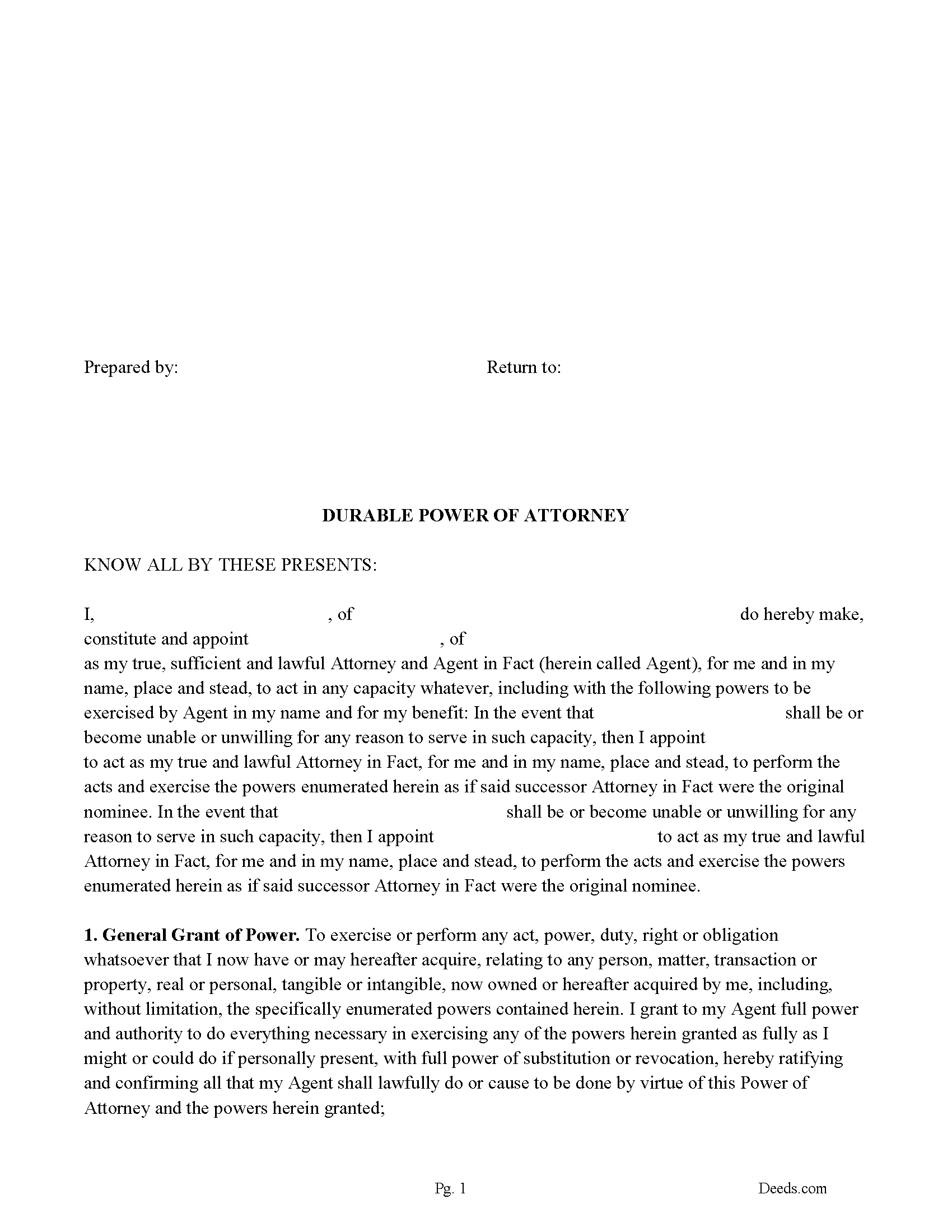
This is a Durable General Power of Attorney (by which a principal
designates another his attorney in fact in writing and the writing contains the
words "This power of attorney shall not be affected by subsequent disability or
incapacity of the principal, or lapse of time,") ( 873105. Definition)
The powers granted are general and broad, a short synopsis of each power.
1. General Grant of Power. To exercise or perform any act, power, duty, right or obligation whatsoever that I now have or may hereafter acquire.
2. Collection Powers. To forgive, request, demand, sue for, give, recover, collect, receive, hold all such sums of money debts, etc.
3. Real Property Powers. To bargain, contract, agree for, option, purchase, acquire, receive, give, improve, maintain, repair, insure, etc
4. Personal Property Powers. To bargain, contract, agree for, purchase, option, acquire, give, receive, improve, maintain, repair, insure, etc.
5. Contract Powers. To make, do, and transact every kind of business of whatever nature, and also for me and in my name, and as my act and deed, to sign, seal, execute, give, deliver and acknowledge, etc
6. Banking Powers. To make, draw, give,... More Information about the Mississippi General Durable Power of Attorney
Specific Power of Attorney for the Purchase of Property
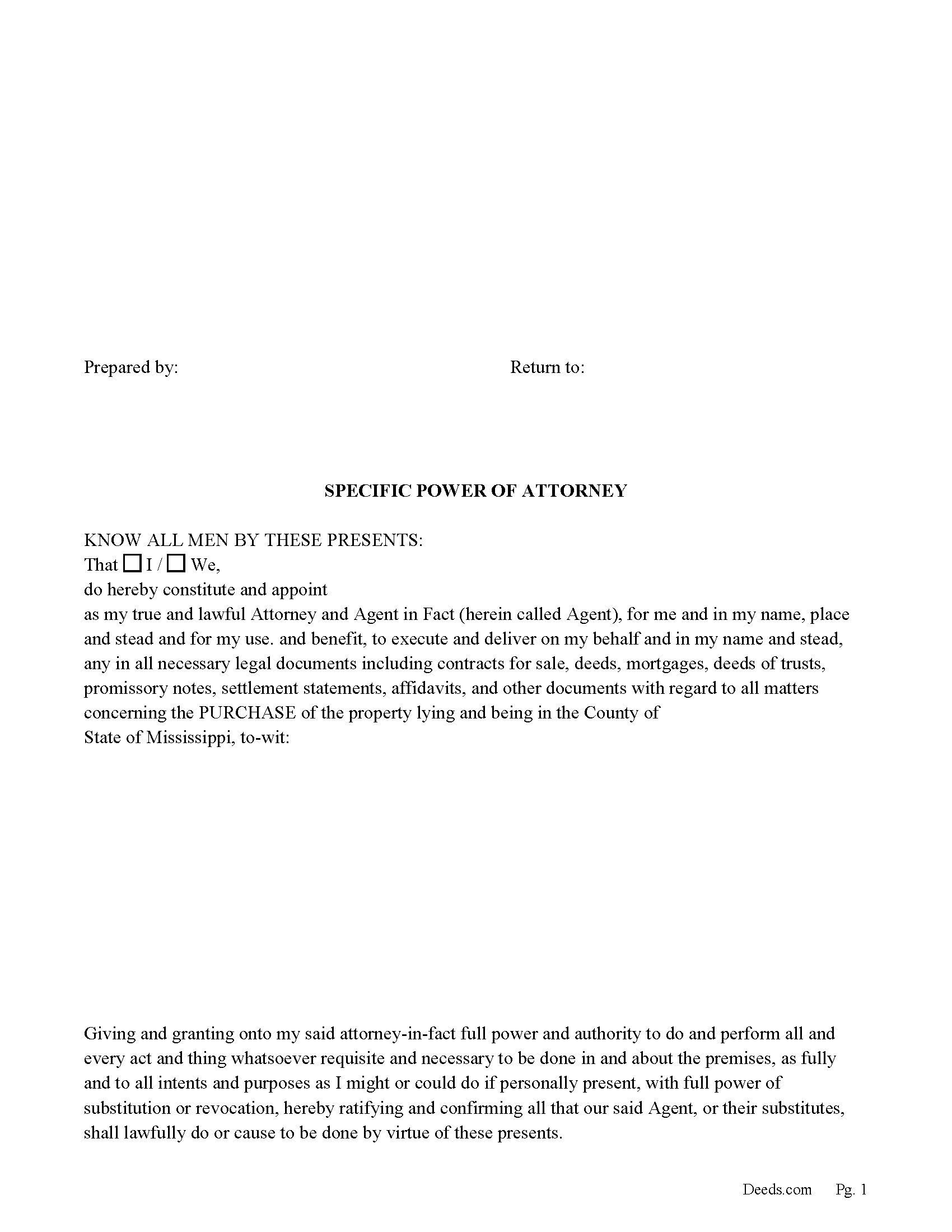
In this form the principal appoints an Attorney in Fact/Agent and empowers him/her to perform in any and all legal documents for the sole purpose of Purchasing a specific property that is located in Mississippi.
87-3-3. Conveyances by attorney in fact.
Conveyances of land, or contracts relating thereto, executed by an attorney in fact for his principal, and duly acknowledged or proved, shall have the same force and effect as if executed and acknowledged by the principal; and where a conveyance by an attorney is in execution of letters of attorney, so acknowledged or proved and recorded, it shall pass the interest of the principal though not formally executed in his name.
This Specific Power of Attorney is Durable and will not terminate upon the disability or incapacity of the principal. This power of attorney shall expire within (DAYS ENTERED) days from date herein or by written revocation.
(Mississippi SPOA-Purchase Package includes form, guidelines, and completed example)
... More Information about the Mississippi Specific Power of Attorney for the Purchase of Property
Specific Power of Attorney for the Sale of Property
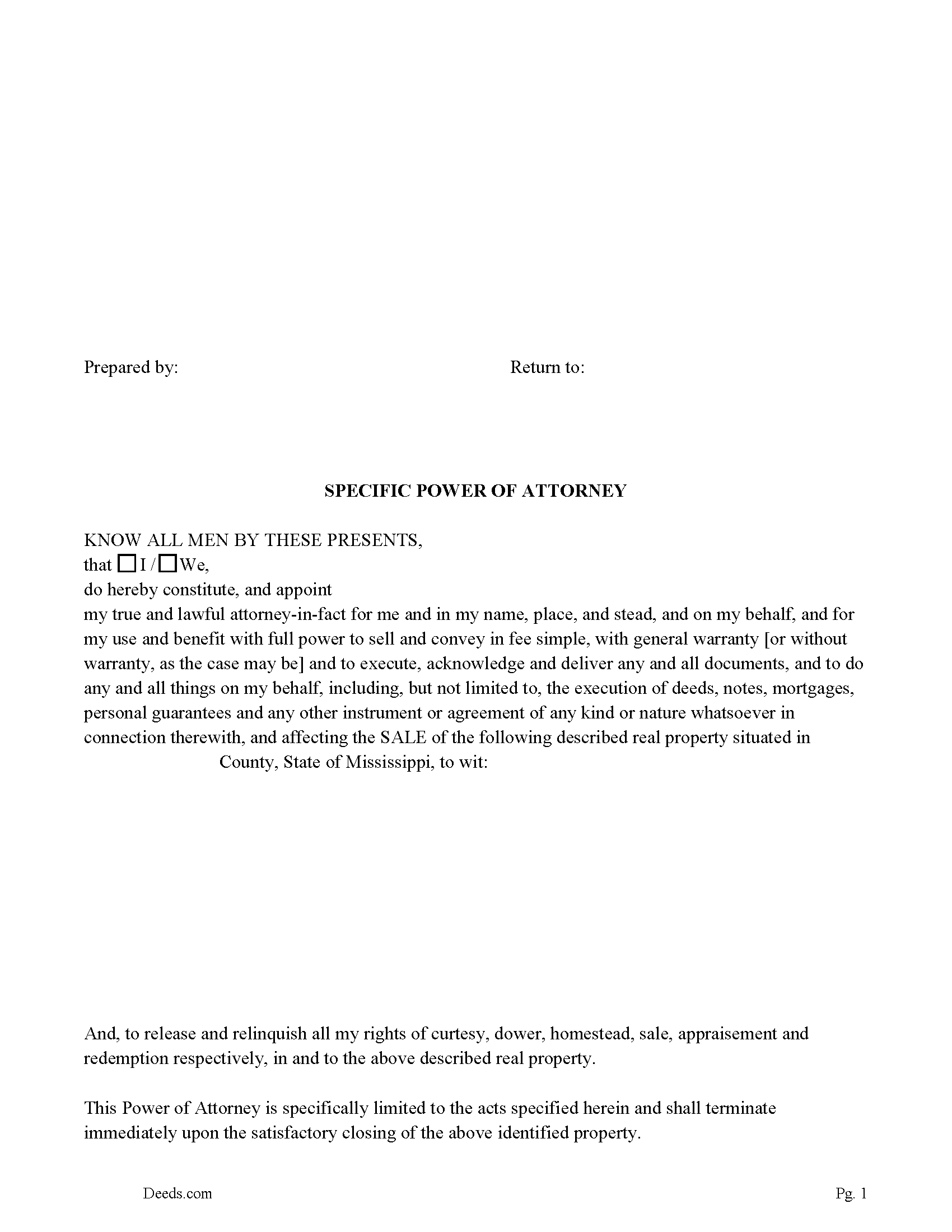
In this form the principal appoints an Attorney in Fact/Agent and empowers him/her to perform in any and all legal documents for the sole purpose of Selling a specific property that is located in Mississippi.
87-3-3. Conveyances by attorney in fact.
Conveyances of land, or contracts relating thereto, executed by an attorney in fact for his principal, and duly acknowledged or proved, shall have the same force and effect as if executed and acknowledged by the principal; and where a conveyance by an attorney is in execution of letters of attorney, so acknowledged or proved and recorded, it shall pass the interest of the principal though not formally executed in his name.
Universal Citation: MS Code 87-3-9 (2016)
"Know all, that I, George Poindexter, of county, Mississippi, do hereby appoint Albert Brown, of county, my attorney in fact, with full power to sell and convey in fee simple, with general warranty [or without warranty, as the case may be] of title, that land situated in [describe it].
"Witness my signature, the of , A. D. .
"George Poindexter."
and to execute, acknowledge and deliver any and all documents, and to do any and all things on my behalf, including, b... More Information about the Mississippi Specific Power of Attorney for the Sale of Property
Deed of Trust and Promissory Note
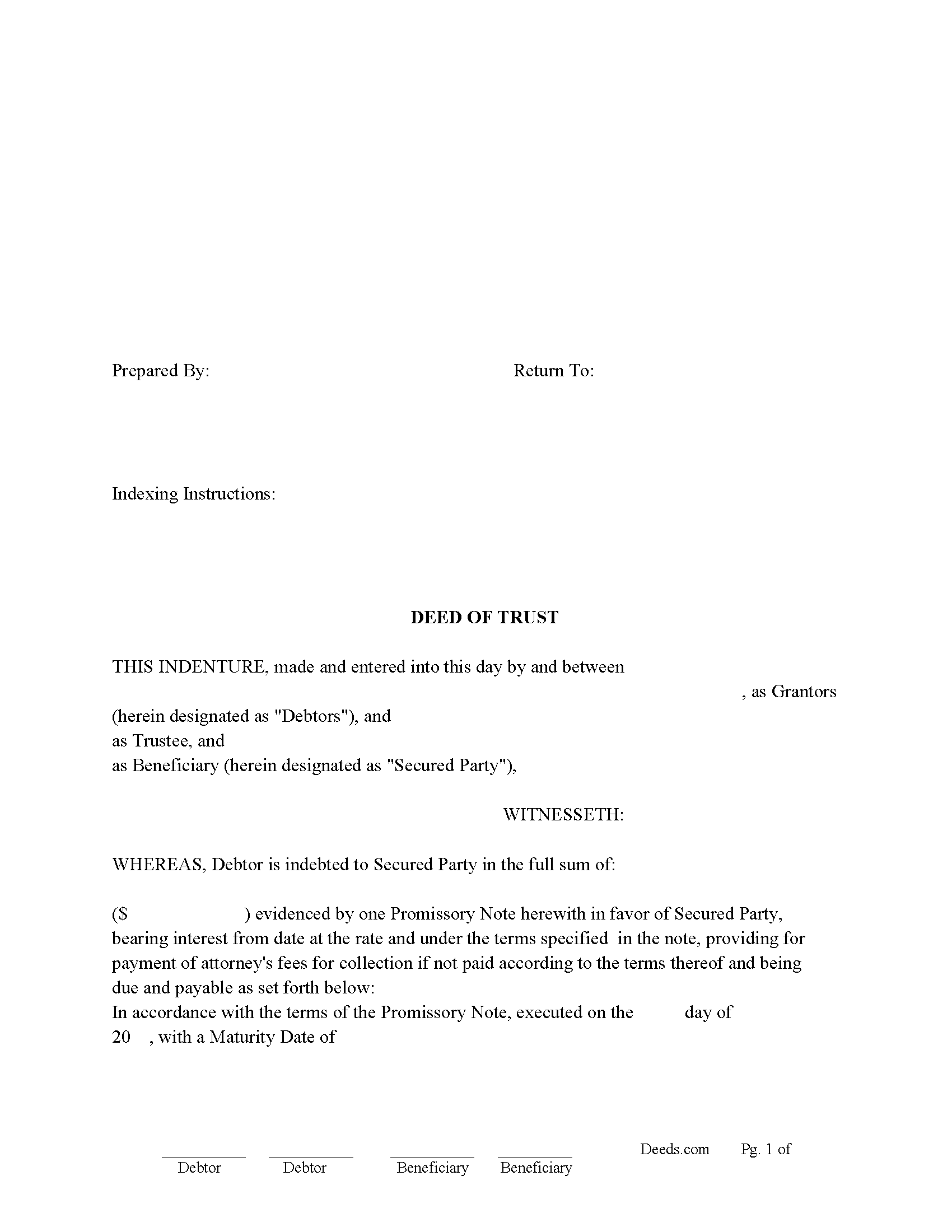
In Mississippi, a Deed of Trust (DOT) is the most commonly used instrument to secure a loan. If the DOT has a "Power of Sale" clause, foreclosure can be done non-judicially, saving time and expense, because the trustee doesn't require the court's involvement. This process is called a Trustee Sale. Explained in Mississippi 89-1-55 - "How lands sold under mortgages and Deeds in Trust"
There are three parties in this Deed of Trust:
1- The Grantor (Borrower)
2- Beneficiary (Lender) and a
3- Trustee (Neutral Third Party)
Basic Concept. The Grantor (Borrower) conveys property title to a Trustee (Neutral Party). A Trustee or beneficiary/Lender can take action against any person for damages.
(The beneficiary or holder of any deed of trust, including his agents, employees, successors, assigns, attorneys-in-fact or other legal representatives, may appoint a trustee or substitute a trustee, with or without the permission of the mortgagor or mortgagors. The trustee or substitute trustee so appointed may be a natural person, partnership, corporation, limited liability company, professional association or any other legal entity.) (MS Code 89-1-63)(3))
Debtors/Borrowers shall be in ... More Information about the Mississippi Deed of Trust and Promissory Note
Assignment of Deed of Trust
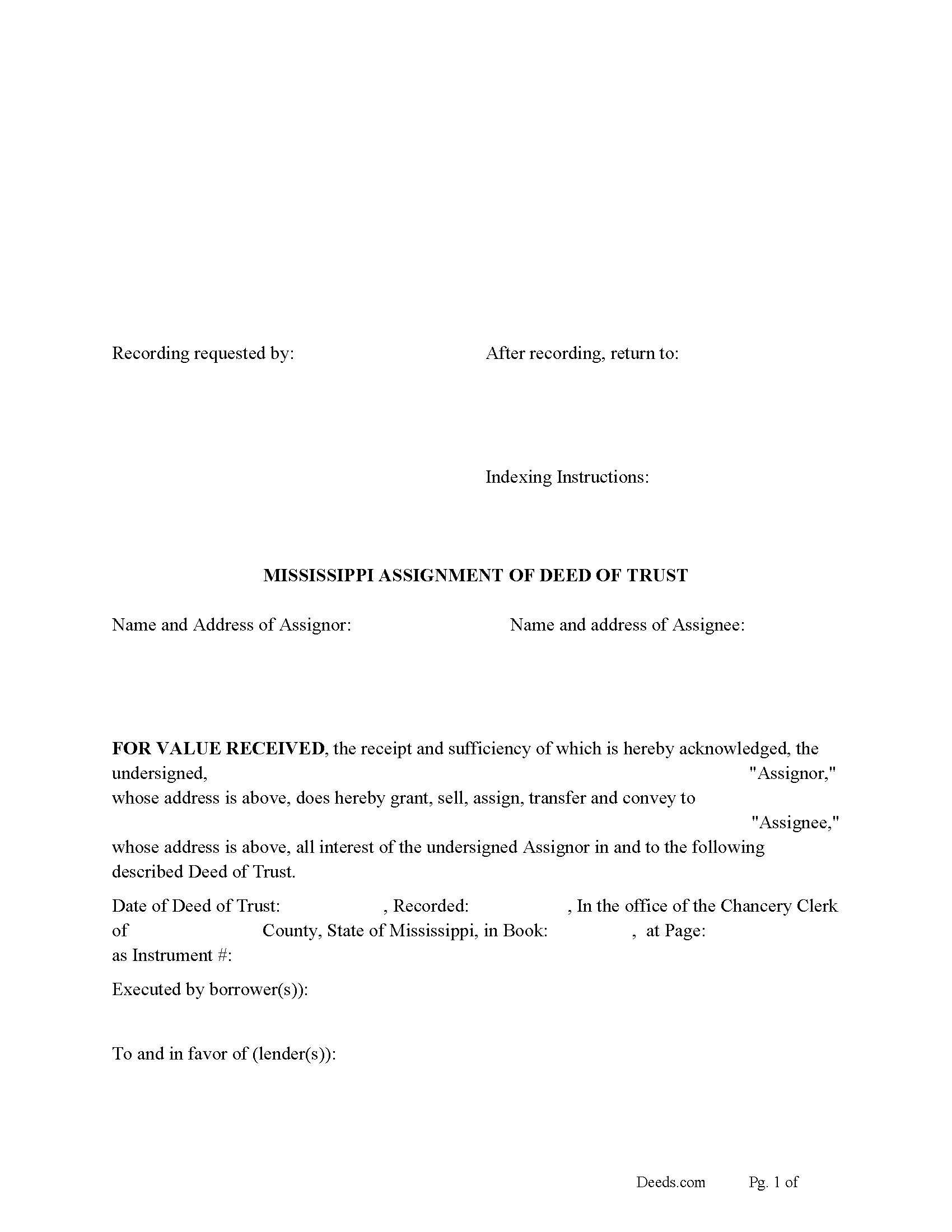
Use this form to transfer a Deed of Trust to another party. The holder of the Deed of Trust becomes the Assignor and transfers rights to the Assignee, this is usually done when a Deed of Trust has been sold. An Assignment of Deed of Trust (secured by a Deed of Trust or other lien of record, shall be entered on the margin of the record of the lien or said assignment shall be acknowledged and filed for record.) (Except as provided in Section 89-5-37) (89-5-17). [The assignment or transfer of a secured indebtedness need not be filed for record nor entered on the margin of the record if the holder thereof is represented by an agent, trustee or the like disclosed as beneficiary in the mortgage or deed of trust.] [MS Code 89-5-37]
Current Borrowers must be notified of the assignment. Notification consists of contact information of the new creditor, recording dates, recording instrument numbers, changes in loan, etc. Included are "Notice of Assignment of Deed of Trust" forms.
The Truth and lending act requires that borrowers be notified when their Deed of Trust has been sold, transferred, or assigned to a new creditor. Generally, within 30 days to avoid up to $2,000.00 in statutory ... More Information about the Mississippi Assignment of Deed of Trust
Release of Deed of Trust
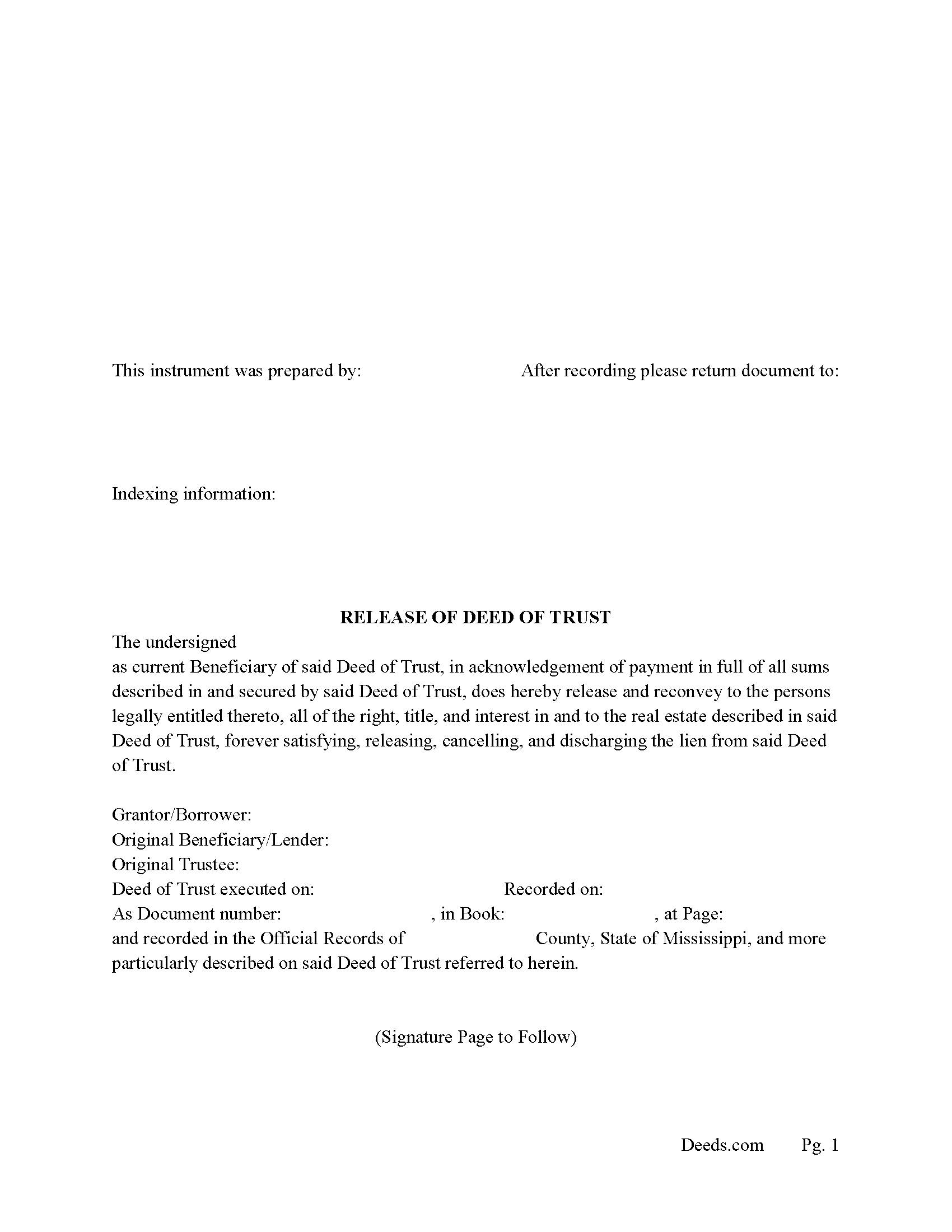
This form is used by the lender himself/herself to release a Deed of Trust when it has been paid in full, even if the lender was not the original lender on the Deed of Trust in question. Once recorded - (attested by the clerk of the chancery court and discharge and release the same, and shall bar all actions or suits brought thereon, and the title shall thereby revest in the grantor.) (MS Statute 89-5-21)(1))
In general, the lender has (one (1) month after written request, cancel on the record the Deed of Trust) to avoid penalty. A Deed of trust in Mississippi can be released by the lender or by his/her attorney, this form is to be used by the current lender of record. (MS Statute 89-5-21)(2))
(Mississippi Release of DOT Package includes form, guidelines, and completed example) For use in Mississippi Only.
... More Information about the Mississippi Release of Deed of Trust
Substitution of Trustee
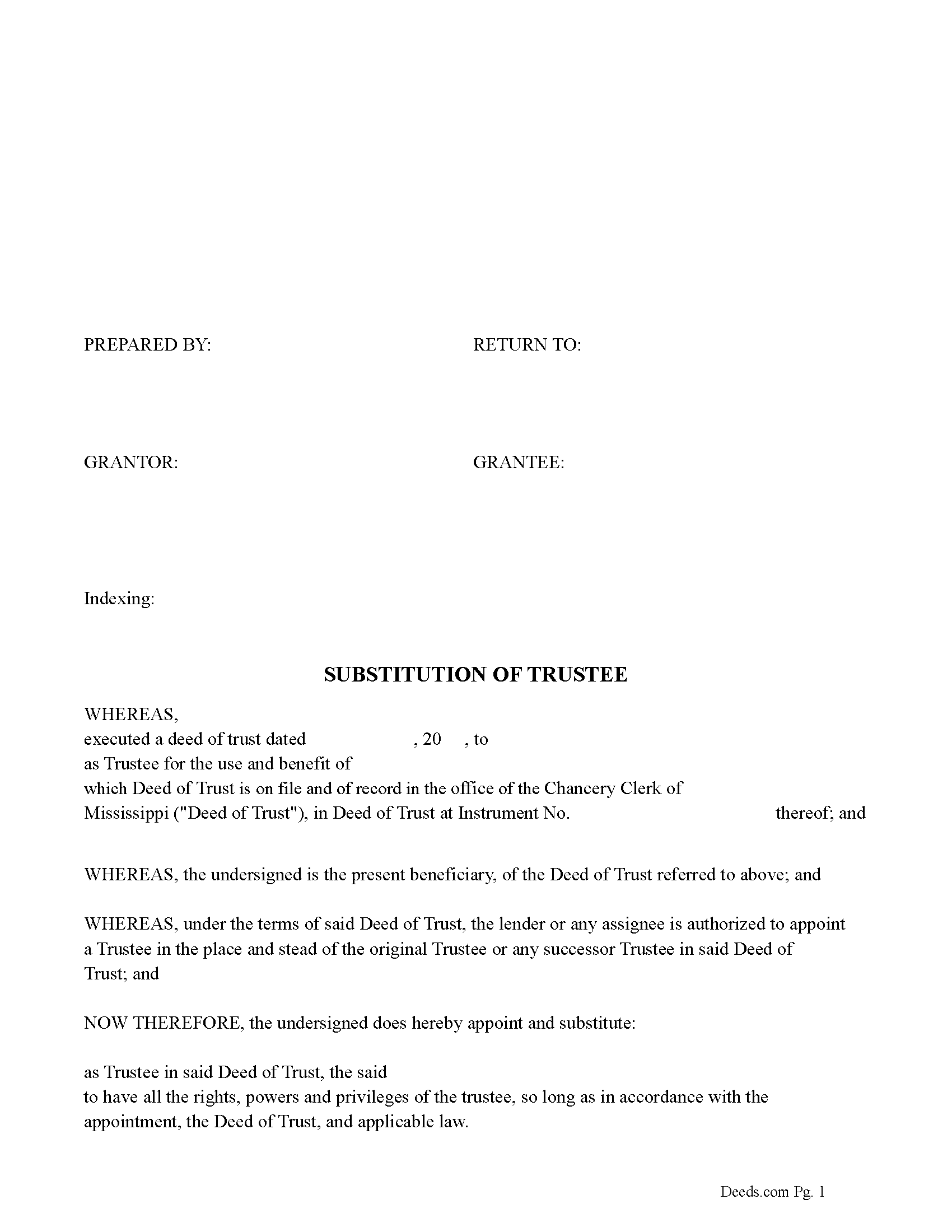
This form is used by the current beneficiary/lender to appoint a substitute trustee for a previously recorded Deed of Trust. (The beneficiary or holder of any deed of trust, including his agents, employees, successors, assigns, attorneys-in-fact or other legal representatives, may appoint a trustee or substitute a trustee, with or without the permission of the mortgagor or mortgagors. The trustee or substitute trustee so appointed may be a natural person, partnership, corporation, limited liability company, professional association or any other legal entity.) (MS Code 89-1-63)
(Mississippi SOT Package includes form, guidelines, and completed example) For use in Mississippi only.
... More Information about the Mississippi Substitution of Trustee
Trustee Deed for Sale of Foreclosed Property
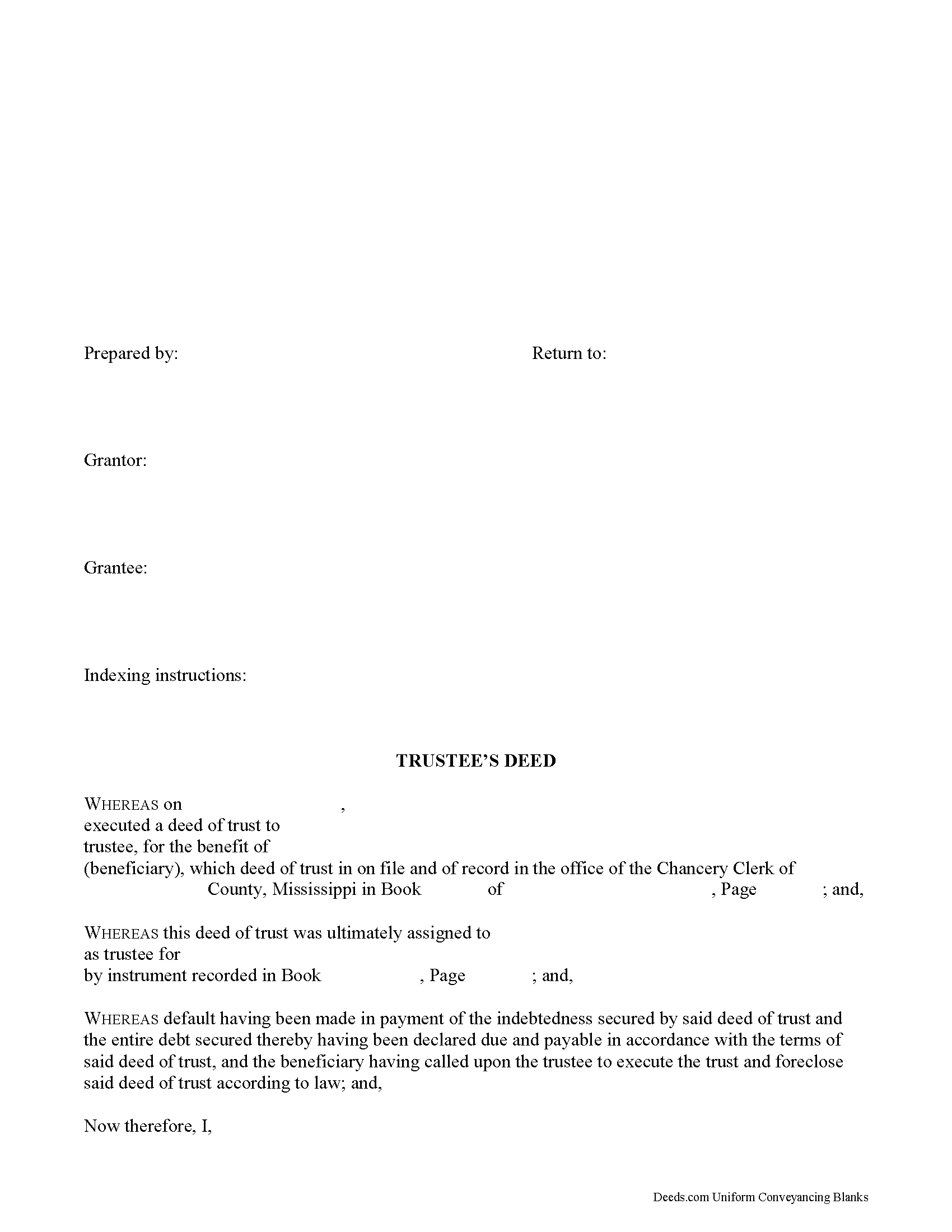
The trustee's deed is used to convey real property after foreclosure and sale under a deed of trust. It takes its name from the executing party rather than from the type of warranty the deed contains. After conducting a trustee's sale at public auction, the trustee uses the deed to vest title to the property in the name of the highest bidder.
A deed of trust (alternately called a trust deed or a deed in trust) is a variation of a mortgage whereby a trustee holds legal title to property as security for the repayment of a loan. The borrower, called the trustor or grantor, executes the deed of trust to the trustee for the benefit of the lender, called the beneficiary. The trustee is generally an agent of the beneficiary.
Upon fulfillment of the terms of the deed of trust, the trustee revests the legal title in the name of the borrower (Miss. Code Ann. 89-1-49(1)). If the borrower breaches the conditions of the deed of trust, the beneficiary can instruct the trustee to initiate foreclosure proceedings. In Mississippi, "any deed of trust...may confer on the trustee...the power of sale"; this power must be conferred upon the trustee in the deed of trust in order for him/her to act... More Information about the Mississippi Trustee Deed for Sale of Foreclosed Property
Assignment of Leases and Rents
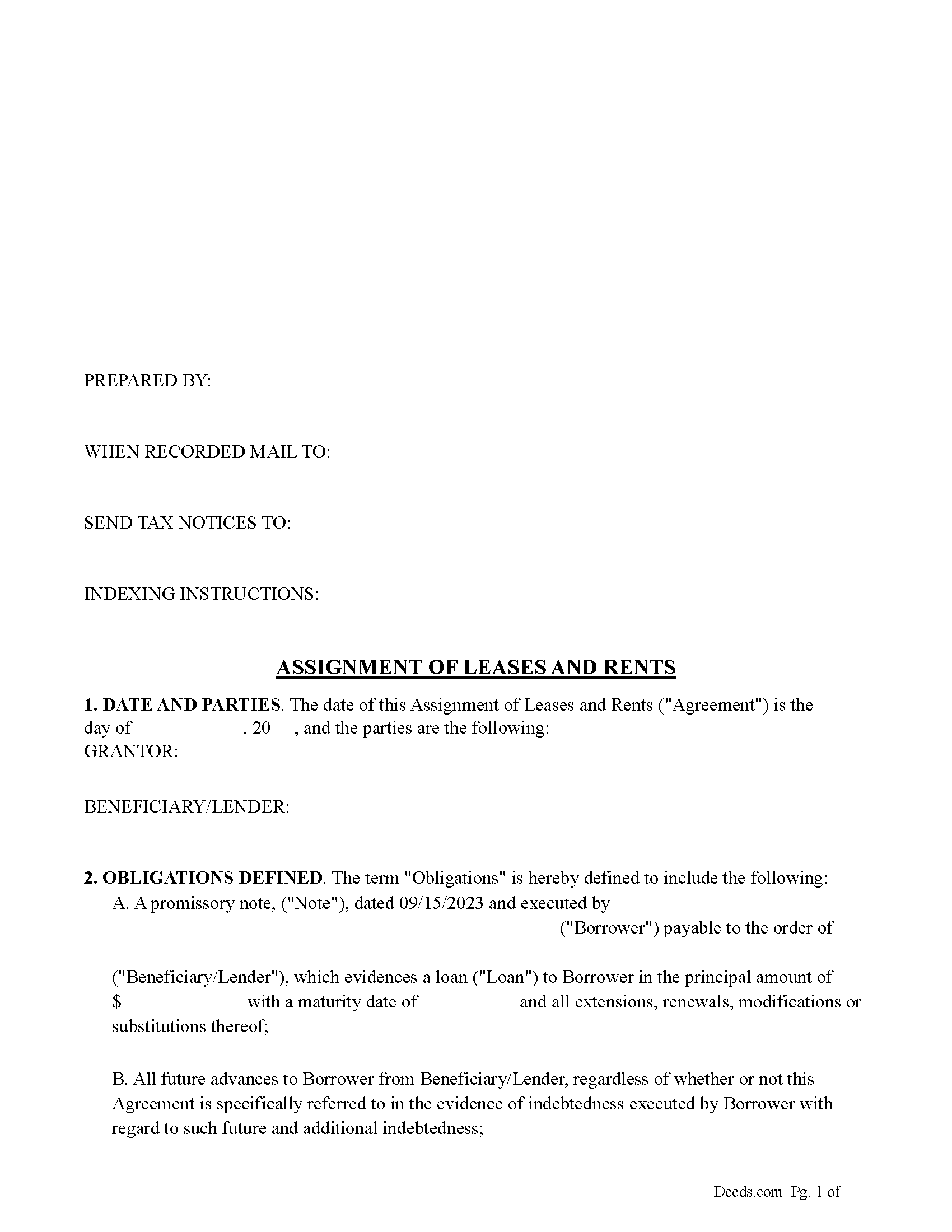
This form induces the Beneficiary/Lender to make a Loan (Deed of Trust or Mortgage) to the Borrower(s). This is done by the Borrower(s)/Grantor(s) making the following representations and warranties:
A. Grantor has good title to the Leases and Rents and good right to assign them, and no other
person has any right in them;
B. Grantor has duly performed all of the terms of the Leases that Grantor is obligated to perform;
C. Grantor has not previously assigned or encumbered the Leases or the Rents and will not further
assign or encumber the Leases or future Rents;
D. No Rents for any period subsequent to the current month have been collected, and no payment of
Rents has been compromised.
E. Grantor has not received any funds from any lessee ("Lessee") under the Leases in excess of one
month's rent for which credit has not been made on account for accrued Rents, and if any such funds
have been received a copy of said account has been delivered to Beneficiary/Lender, and any copy of such account that has been delivered to Beneficiary/Lender is true and complete. The term "Lessee" in this Agreement shall include all persons or entities obligated to Grantor under the Lease... More Information about the Mississippi Assignment of Leases and Rents
Authority to Cancel Assignment of Leases and Rents
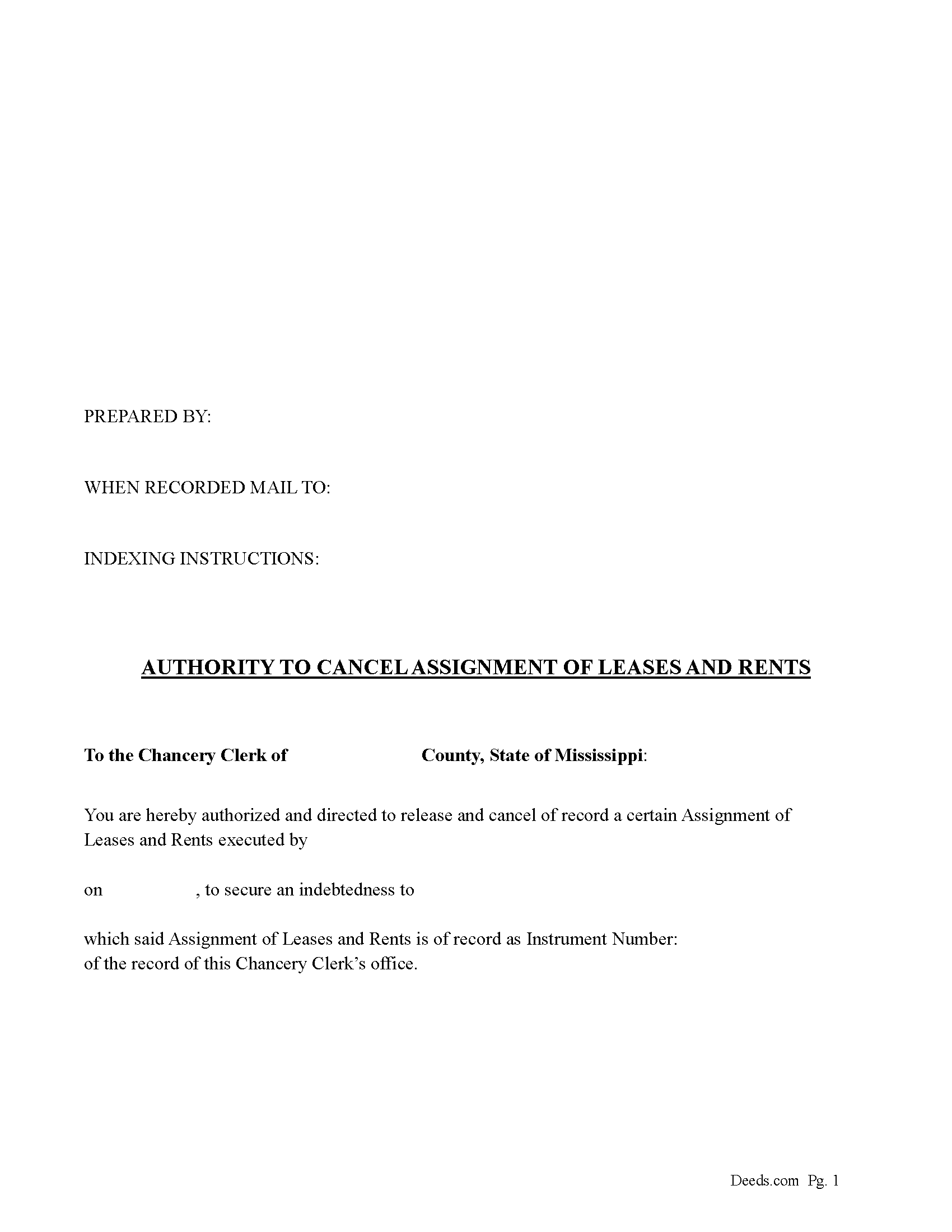
Use this form to cancel a previously recorded Assignment of Leases and Rents document. This is typically done when the loan has been satisfied. The signer authorizes the Chancery Clerk to release and cancel the subject Assignment of Leases and Rents document.
(Mississippi Cancelation of Assignment Package includes form, guidelines, and completed example)... More Information about the Mississippi Authority to Cancel Assignment of Leases and Rents
Contract for the Sale and Purchase Of Real Property
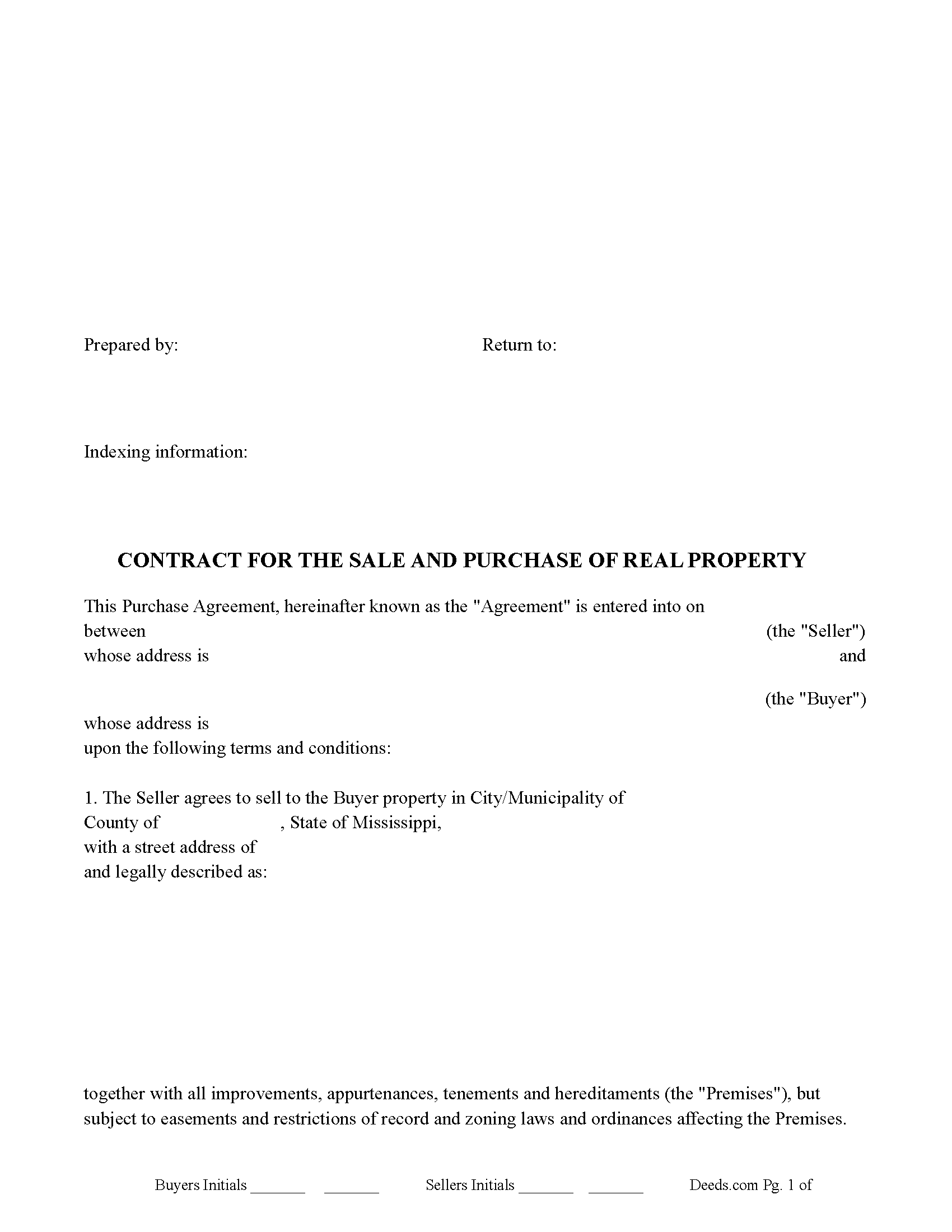
A "CONTRACT FOR THE SALE AND PURCHASE OF REAL PROPERTY" in some states referred to a Land Contract or Contract for Deed is a written legal agreement used to purchase real estate; it is typically used in owner/seller financing.
This form can be used for traditional monthly installments or a balloon payment, which is common with seller financing, (example: three years payments with a balloon payment of $ ______. Or 15 years payment of $______) etc.)
LATE CHARGE: Any above noted payment which is at least days past due, shall be subject to a late charge of $ And an additional $ per day until the payment is received. If any balloon payment is late, it shall be subject to a late fee of $ per day.
IN ADDITION TO ANY OTHER REMEDIES available to the Lender if this Note is not paid in full at the Maturity Date, Borrowers shall pay to Lender an Overdue Loan Fee, which fee shall be due at the time this Note is otherwise paid in full. The "Overdue Loan Fee" shall be determined based upon the outstanding princ... More Information about the Mississippi Contract for the Sale and Purchase Of Real Property
Memorandum of Contract
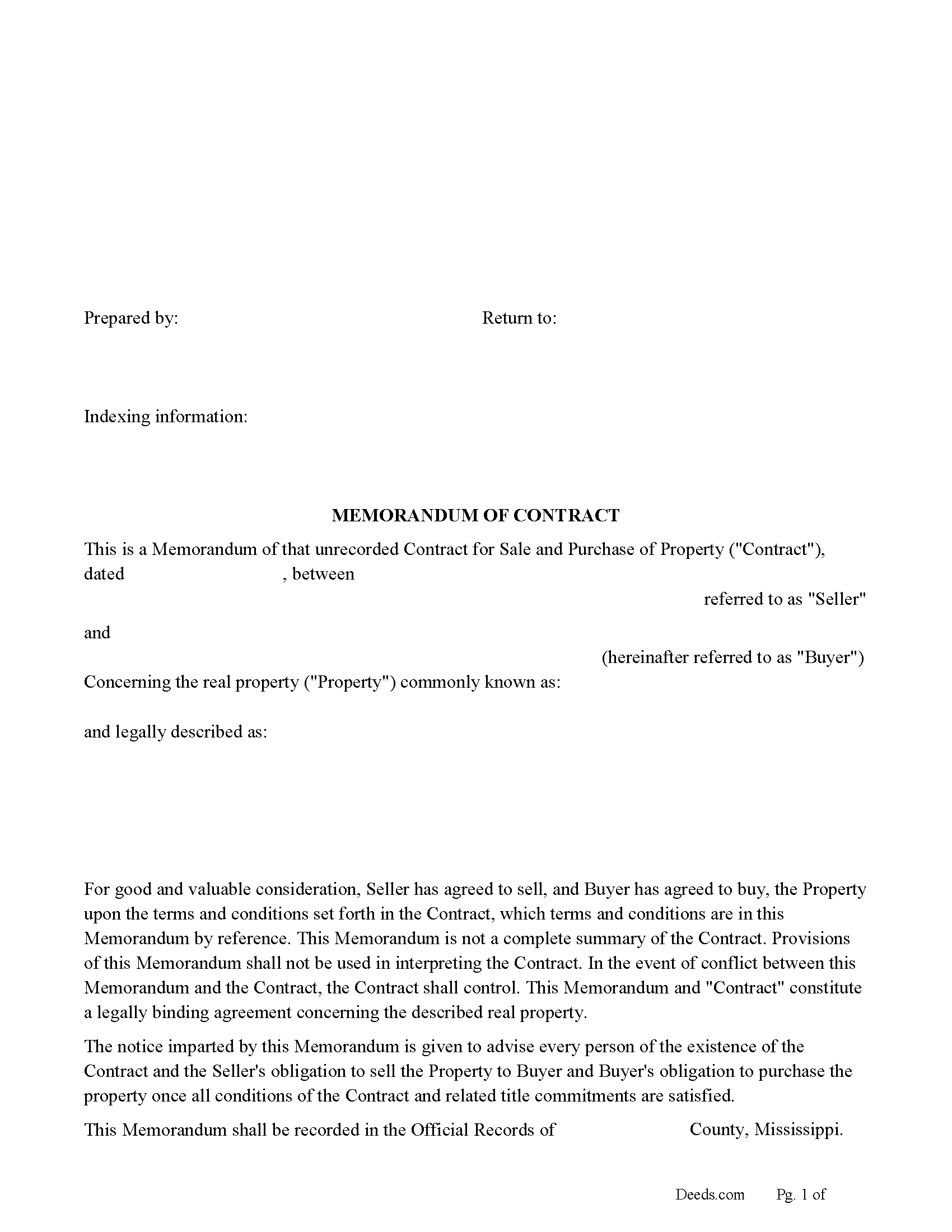
When is this document used?
When a property is sold, and a Contract for the Sale and Purchase of Real Property (often called a Land Contract or Buy-Sell Agreement), has been executed by both parties this Memorandum document is often recorded in the county where the subject property is located instead of the actual Contract. Stating - Seller has agreed to sell, and Buyer has agreed to buy, the Property upon the terms and conditions set forth in the Contract.
Why a Memorandum of Contract?
Privacy - When parties want to keep financial details of a Contract for the Sale and Purchase of Real Property private, a Memorandum is recorded.
Notice - puts the world on notice that a Contract between buyer and seller exists on a specific property.
Legal - legal binding agreement between buyer and seller concerning the property in question.
Protection - Often filed by buyers alone, after a contract has been executed, preventing loans or encumbrances being placed on the property by existing Deed holder. Encumbrances have been placed on properties even though the Contract states they can't. This can be devastating for a buyer who has made payments. A Memorandum is an effective instru... More Information about the Mississippi Memorandum of Contract
Disclaimer of Interest
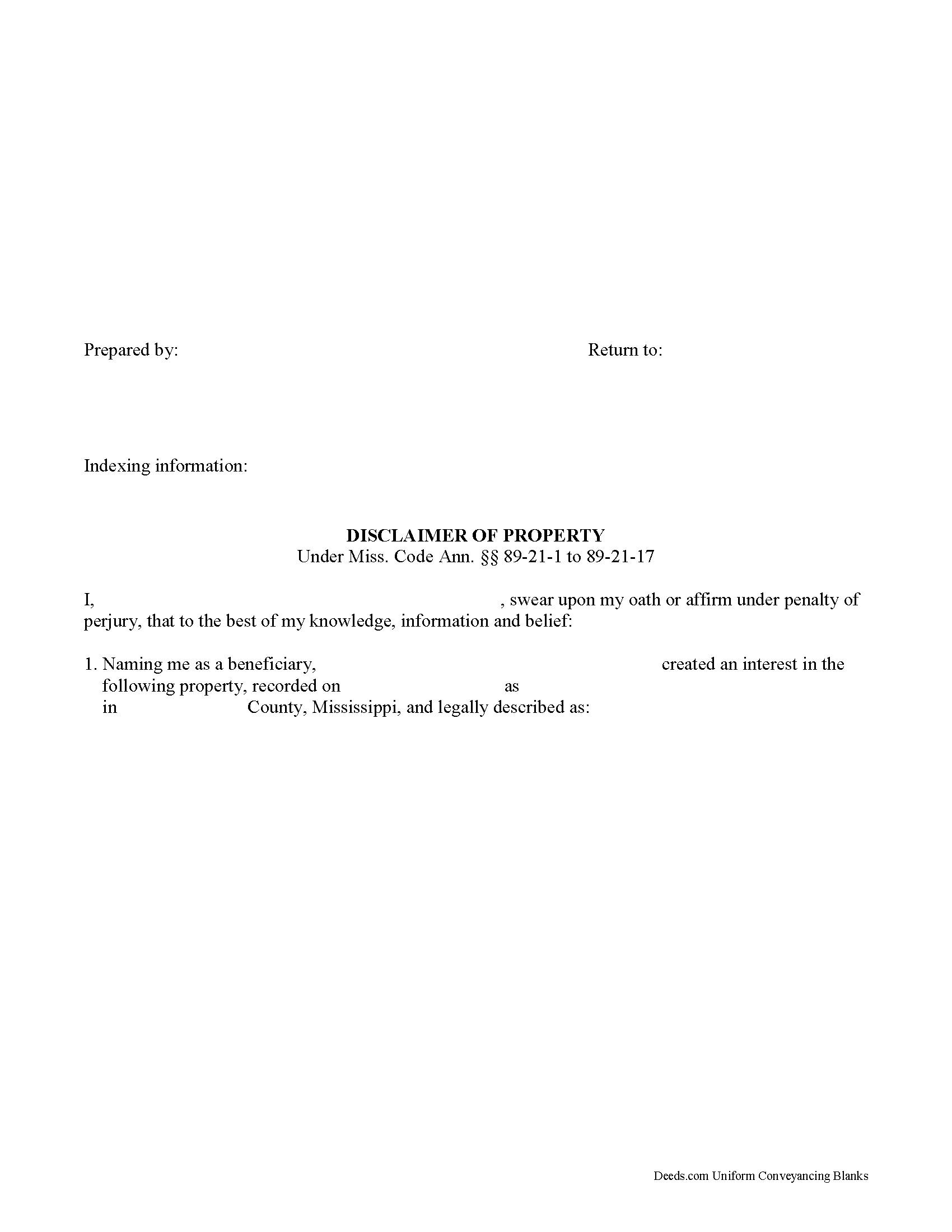
Under the Mississippi statutes, the beneficiary of an interest in property may renounce the gift, either in part or in full (Miss. Code Ann. 89-21-1 to 89-21-17). Note that the option to disclaim is only available to beneficiaries who have not acted in any way to indicate acceptance or ownership of the interest.
The disclaimer must be in writing and include a description of the interest, a declaration of intent to disclaim all or a defined portion of the interest, and be signed by the disclaimant (Miss. Code Ann. 89-21-7).
File the disclaimer within nine months of the transfer (e.g., the death of the creator of the interest) in the chancery court with jurisdiction over the administration of the estate. In addition, deliver a copy of it to the executor, administrator, or any other fiduciary of the decedent's estate, or to the current holder of legal title or possession (Miss. Code Ann. 89-21-5 (1)). In the case of real property, record the original disclaimer, or a copy certified by the clerk of the district court, in the office of the county clerk in the county (or counties) where the real estate is situated (Miss. Code Ann. 89-21-5 (3)).
A disclaimer is irrevocab... More Information about the Mississippi Disclaimer of Interest
Certificate of Trust
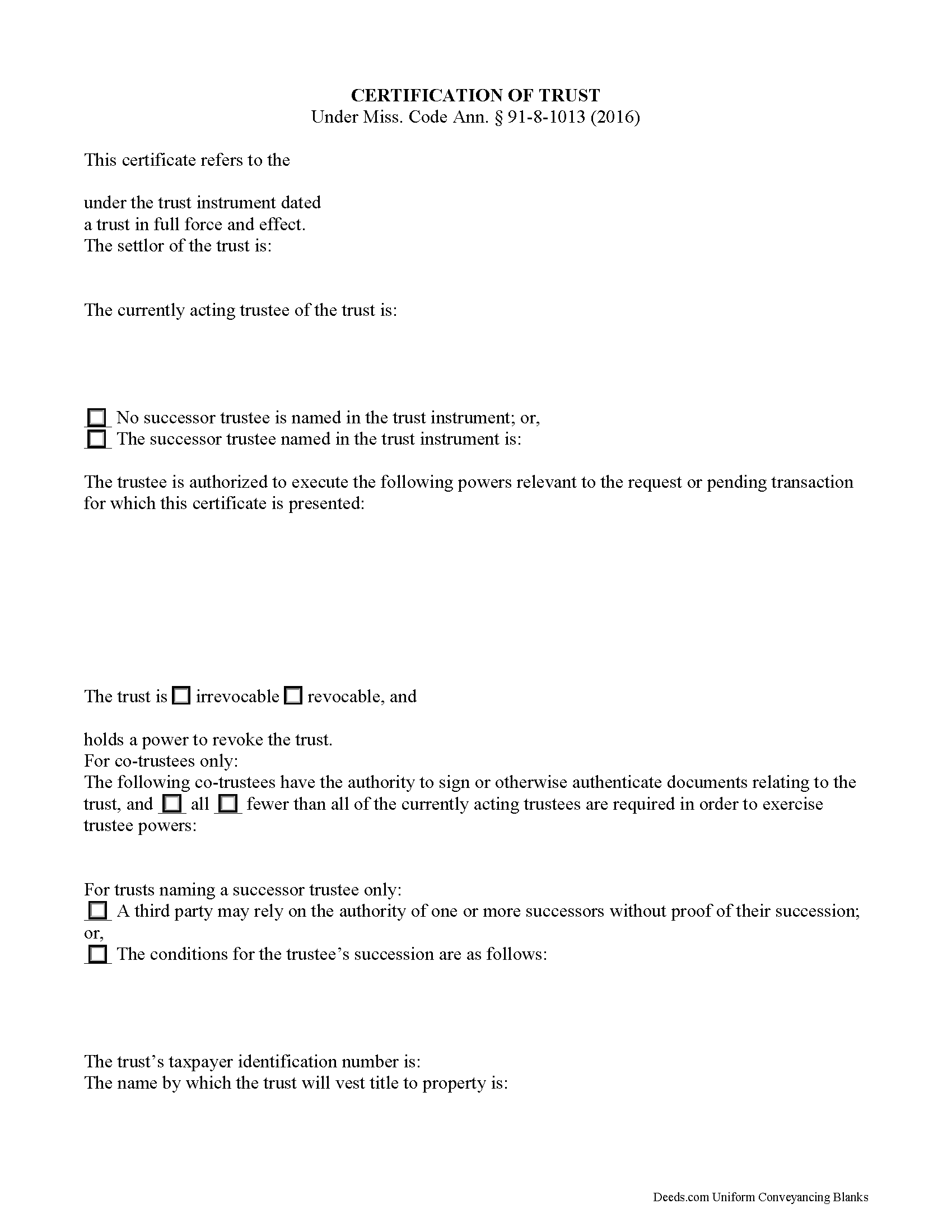
Using a Certification of Trust in Mississippi
The certificate of trust is codified under the Mississippi Trust Code at Miss. Code Ann. 91-8-1013. This certified document is an abstract of the trust instrument, a generally unrecorded document executed by a settlor and containing the trust's full provisions.
A trustee presents the certification of trust when entering into transactions with persons other than trust beneficiaries. It offers proof that the trust exists and the trustee has the authority to enter into the transaction on behalf of the trust. The section of the Mississippi Code covering the certification of trust offers protection to parties dealing with trustees, even if they fail to request a trust certificate (Miss. Code Ann. 91-8-1013(e)).
In a trust arrangement, a trustee administers a trust estate transferred to the trust by a settlor, for the benefit of a third person or party, called the beneficiary. When the trustee conducts business with someone outside of the trust relationship, the certification of trust allows the trustee to maintain the trust's privacy; the identity of trust beneficiaries, the disclosure of which is not essential to the transaction... More Information about the Mississippi Certificate of Trust
Lis Pendens
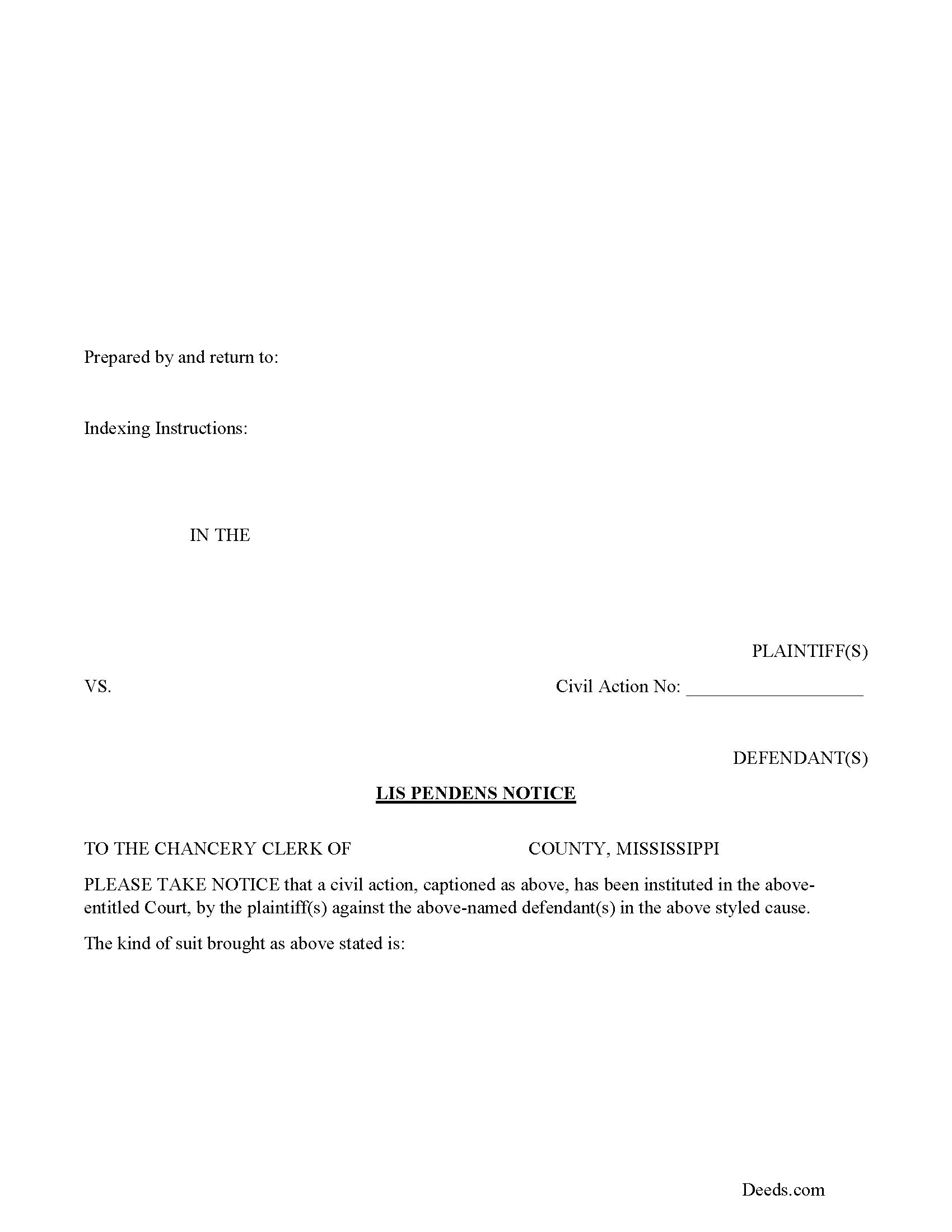
When a suit is filed in any court, affecting title to real property, a Lis Pendens should be filed with the Clerk of the Chancery Court, in any and all county's where said property is located. A Mississippi Lis Pendens requires:
(The Names of all parties to the suit) (A description of the real estate) A brief statement of the nature of the complaint 11-47-3
At which time the Clerk will immediately file the Lis Pendens to become public notice. 11-47-9
(Mississippi LP Package includes form, guidelines, and completed example)
... More Information about the Mississippi Lis Pendens
Release of Lis Pendens
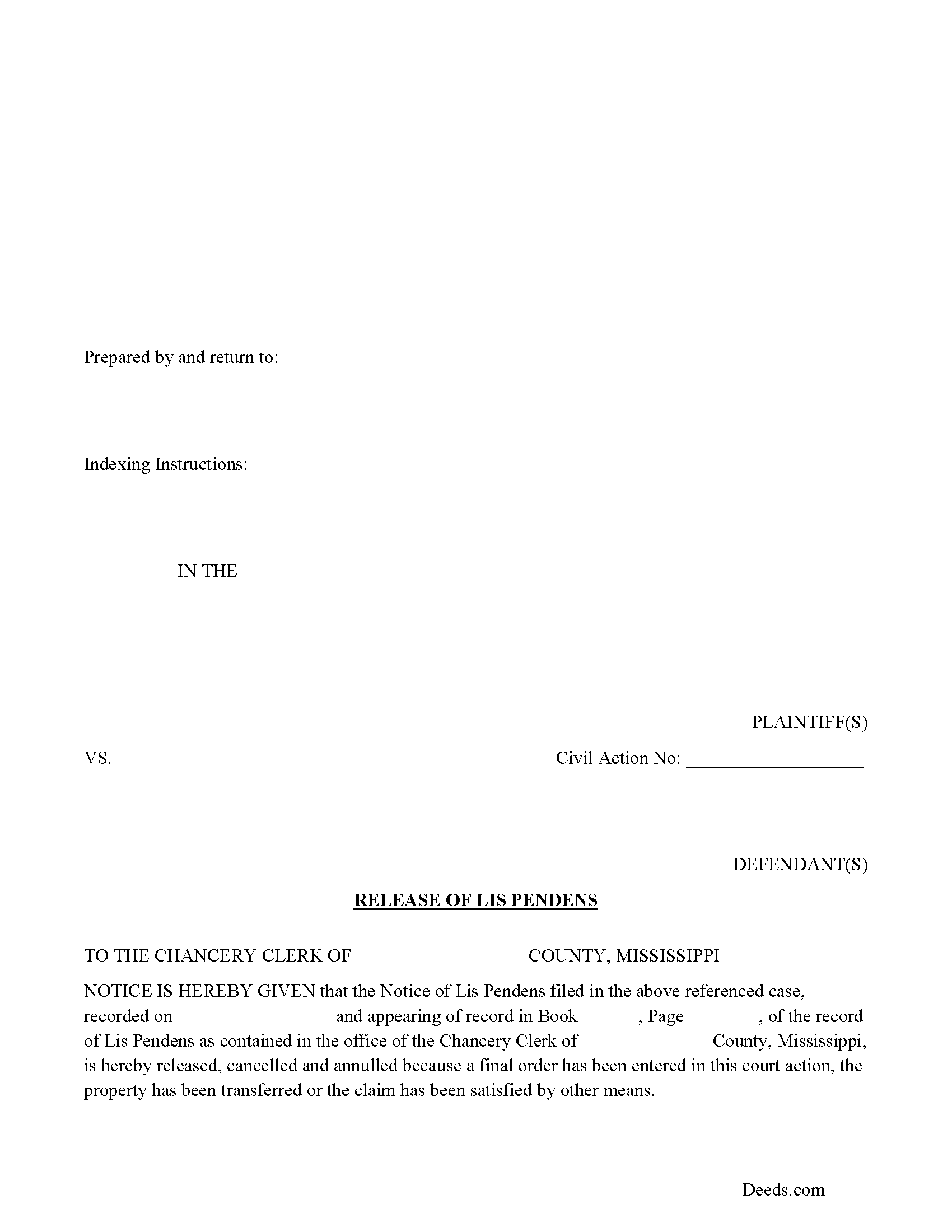
Use this form to release a previously recorded Lis Pendens document. Many civil cases involve multiple parties, this form provides space for such.
(Mississippi Release of LP Package includes form, guidelines, and completed example)... More Information about the Mississippi Release of Lis Pendens